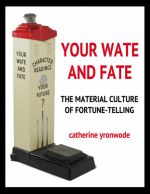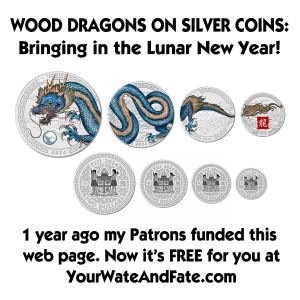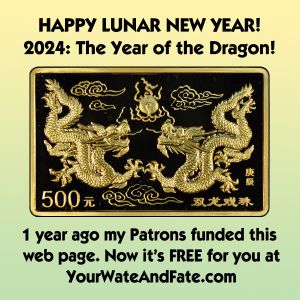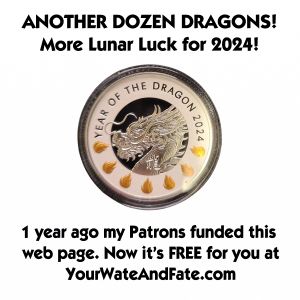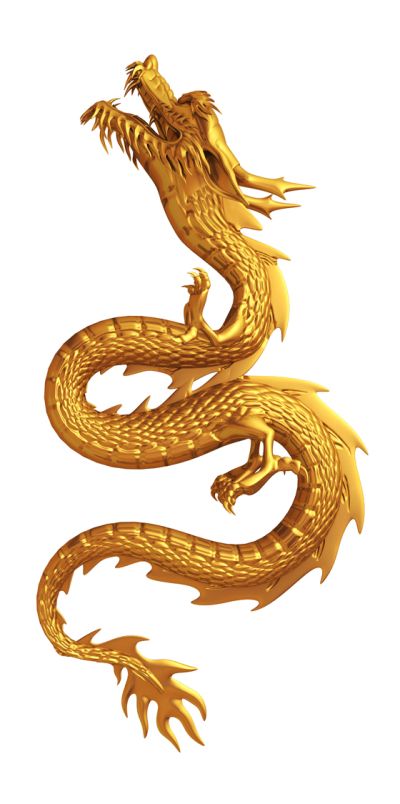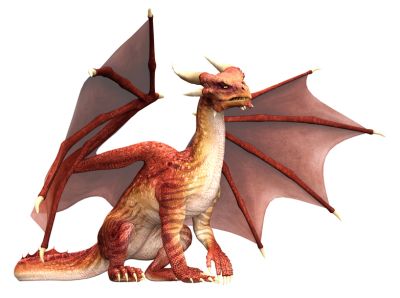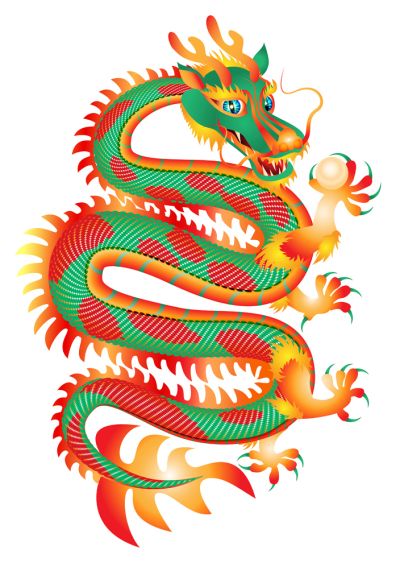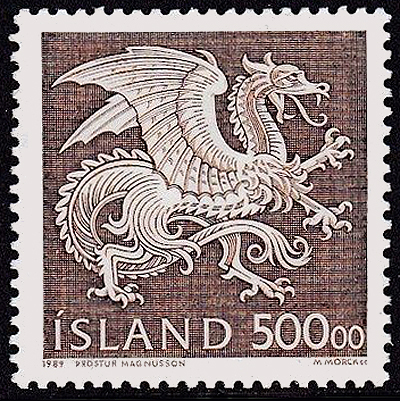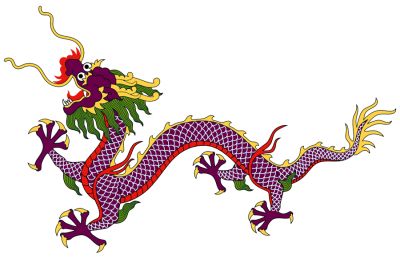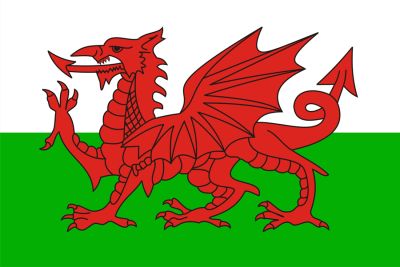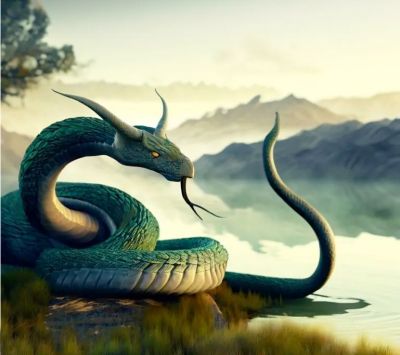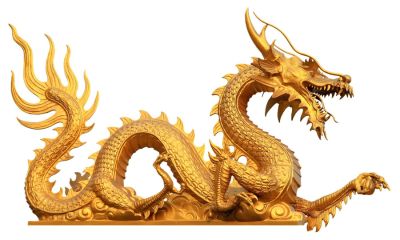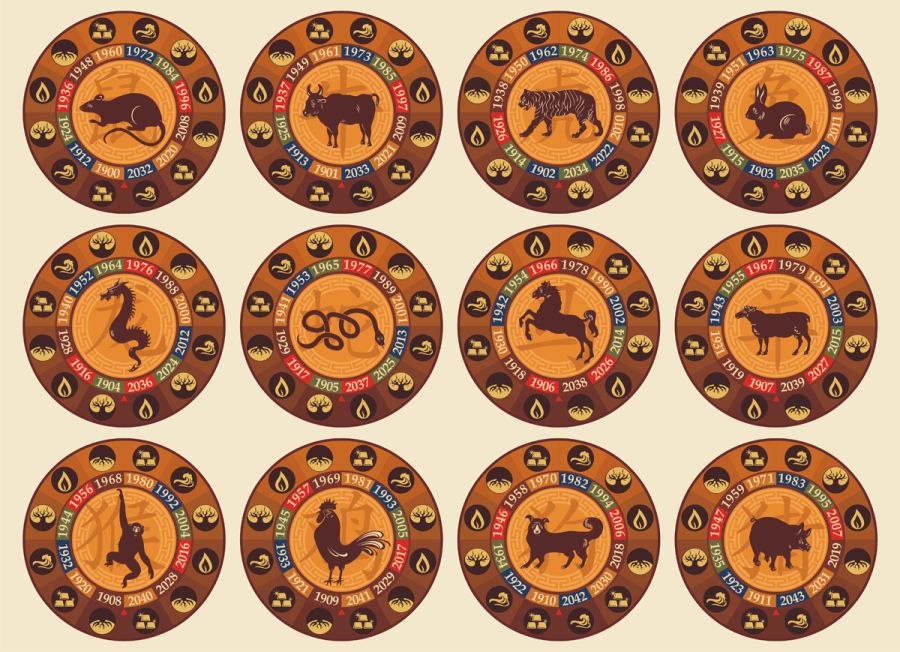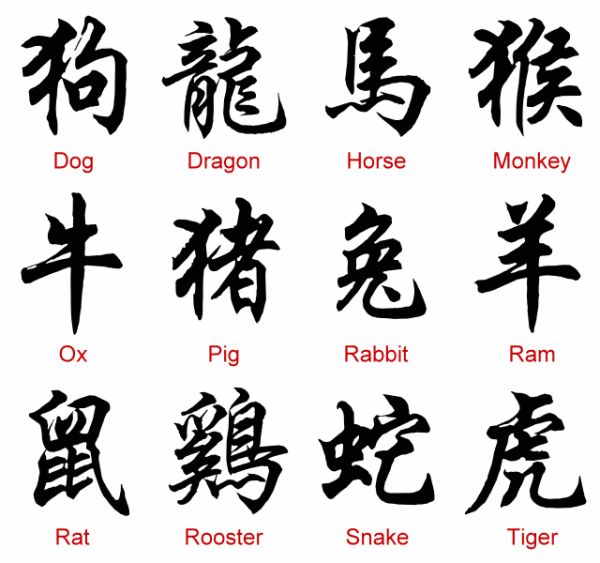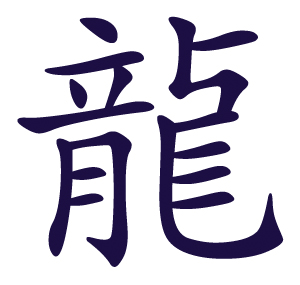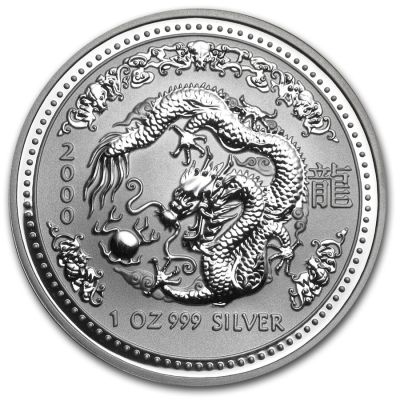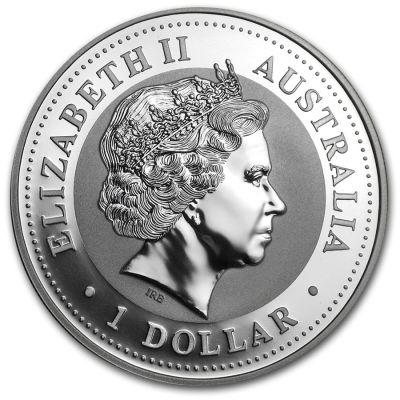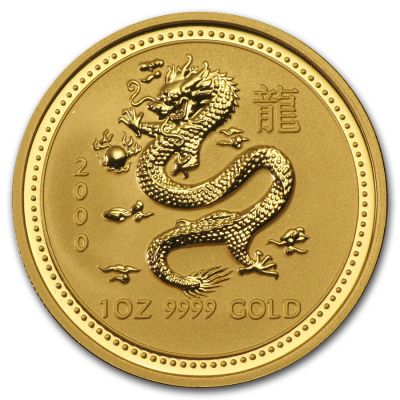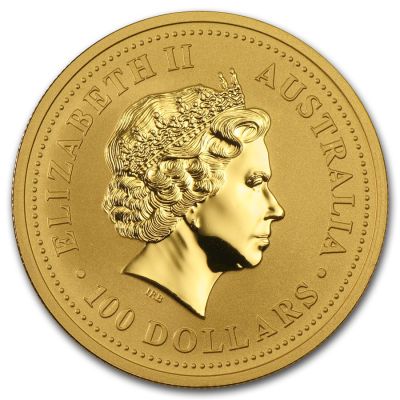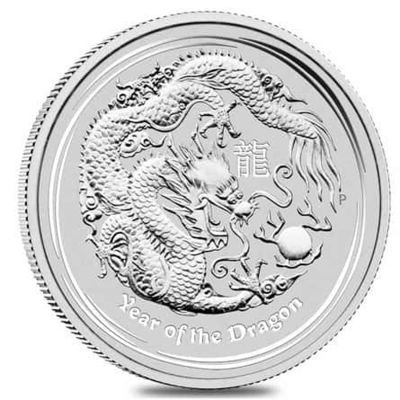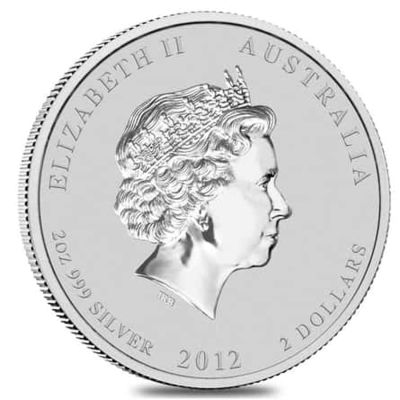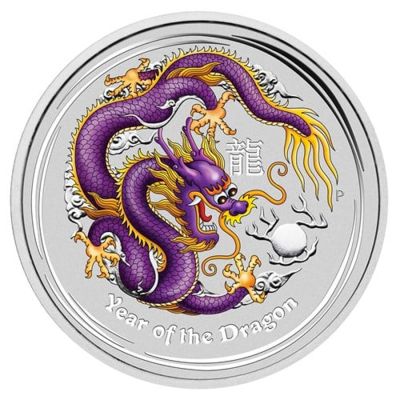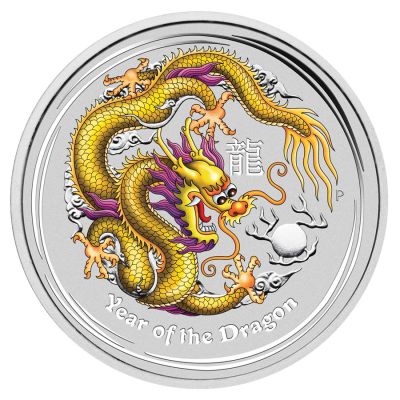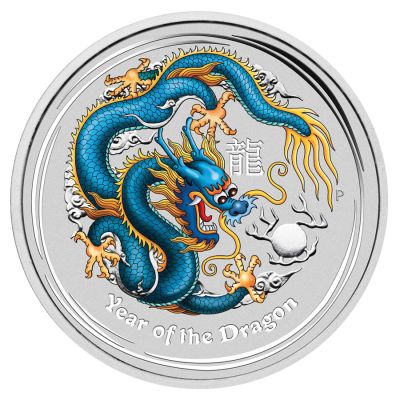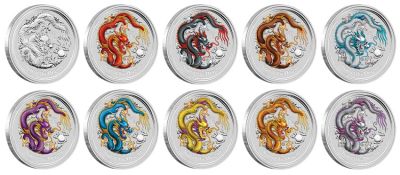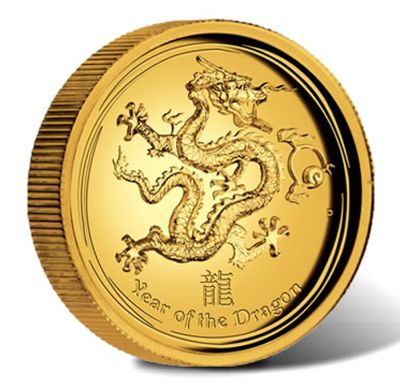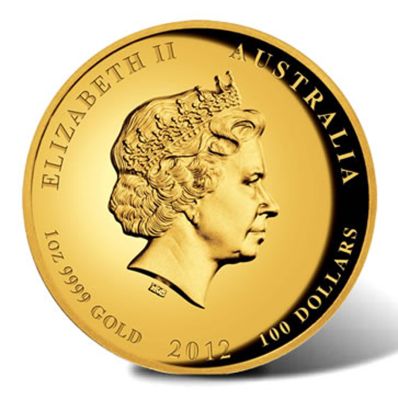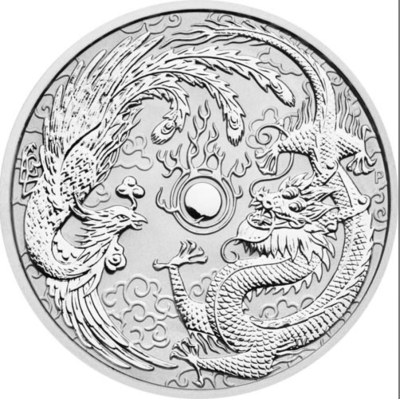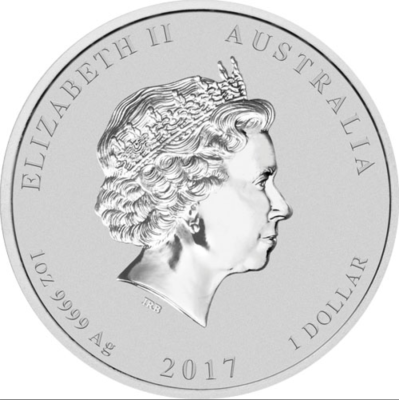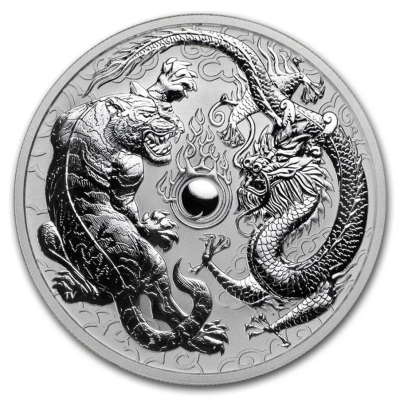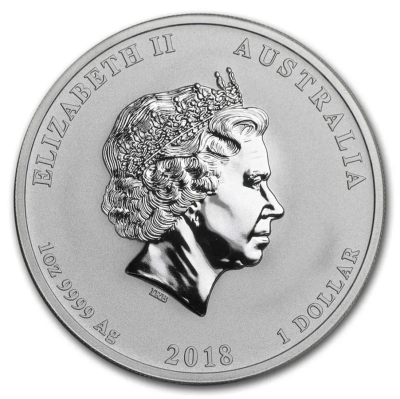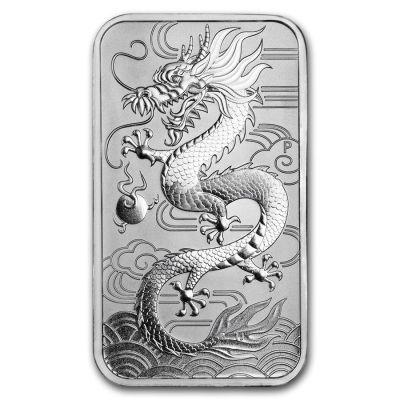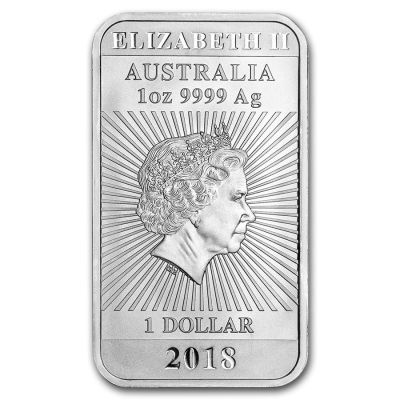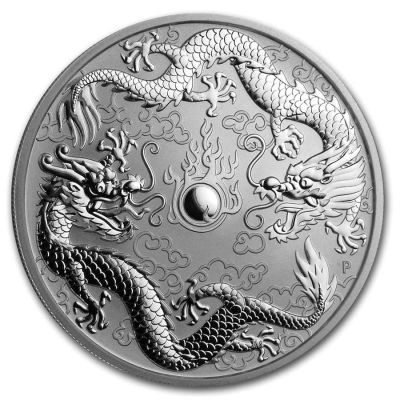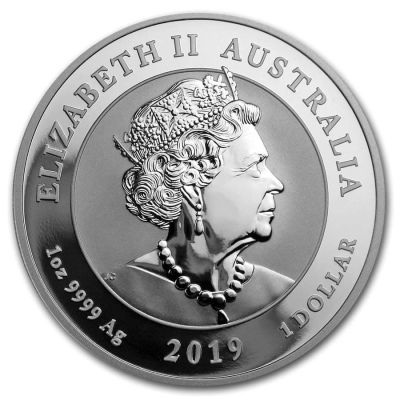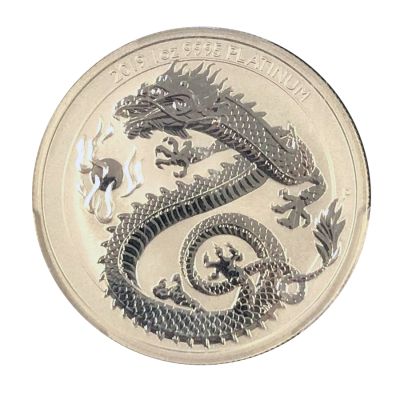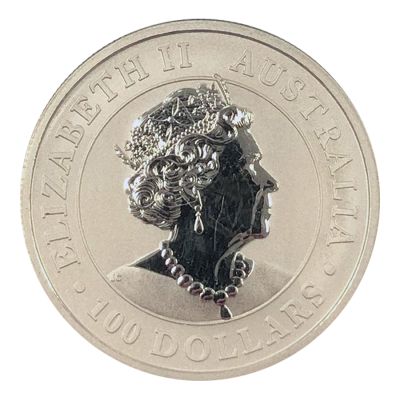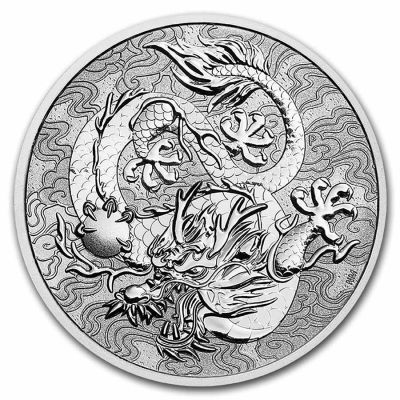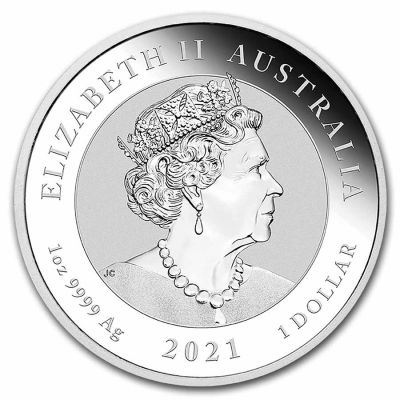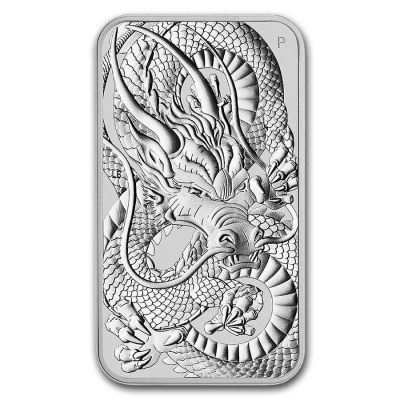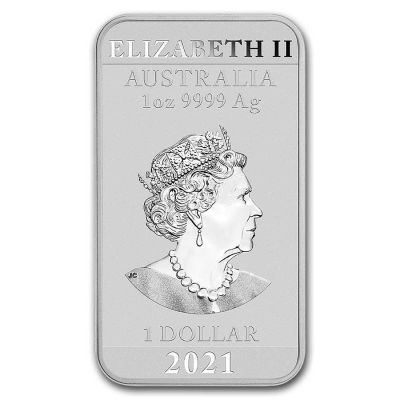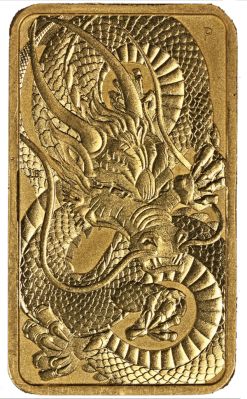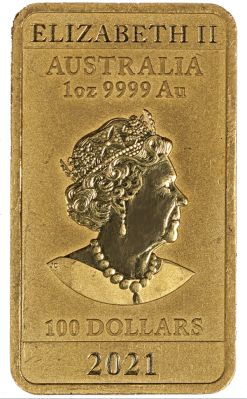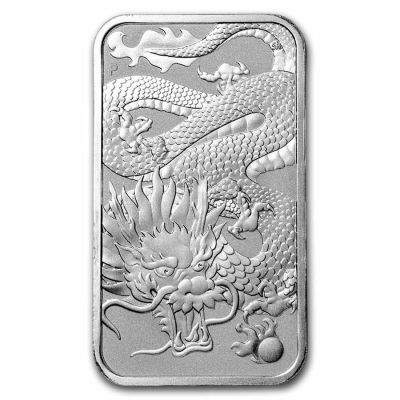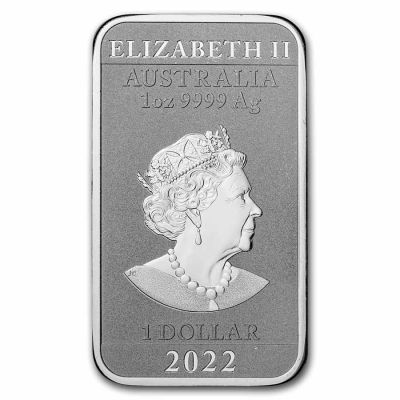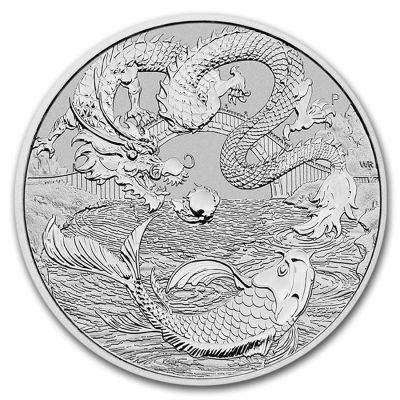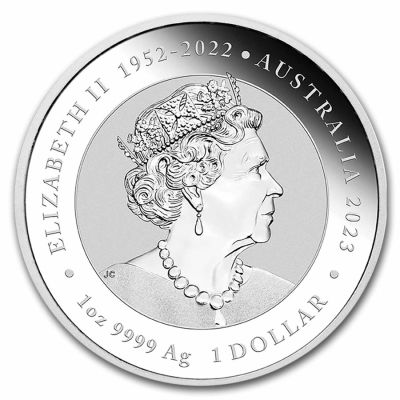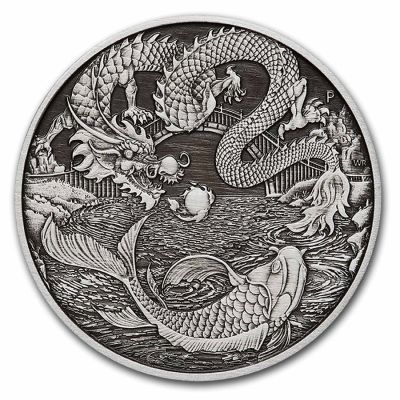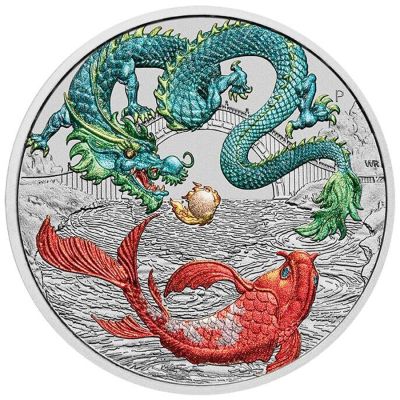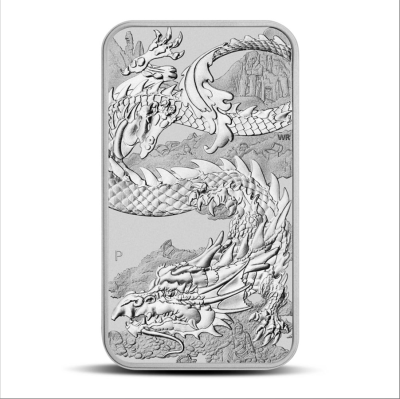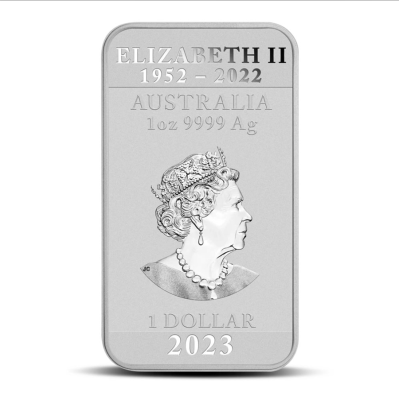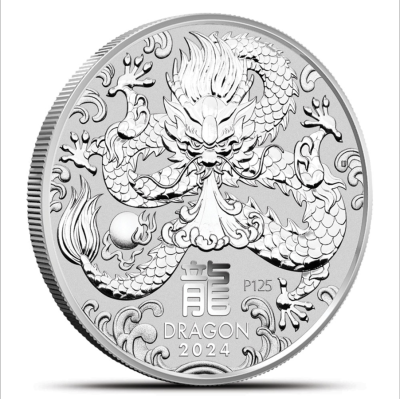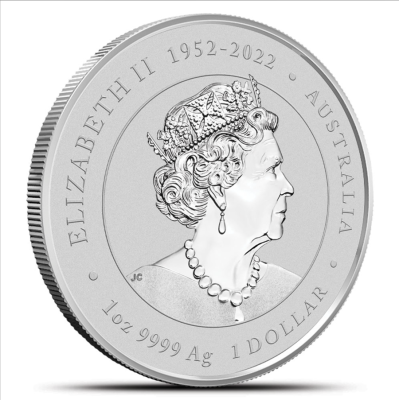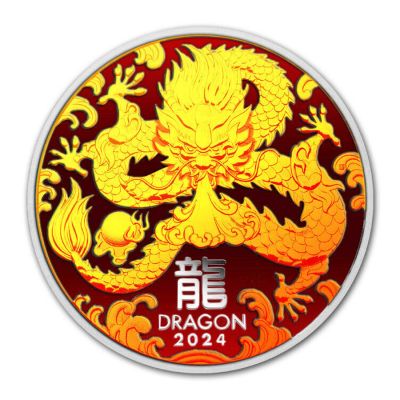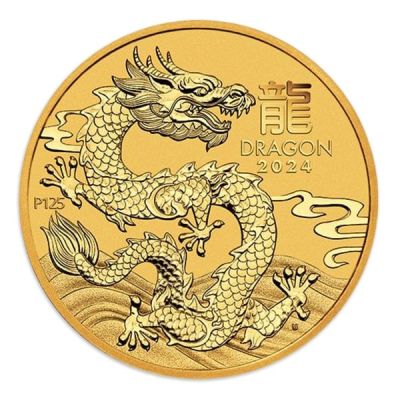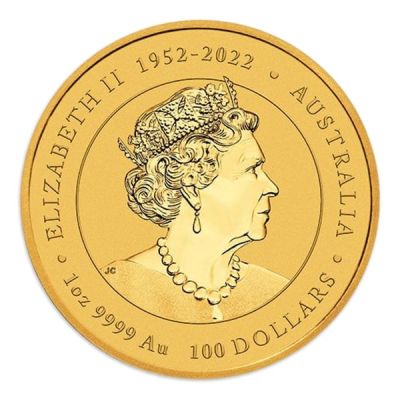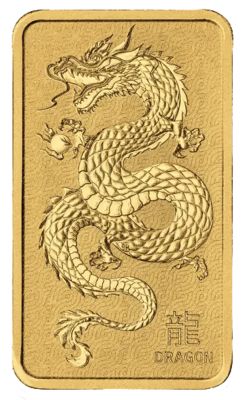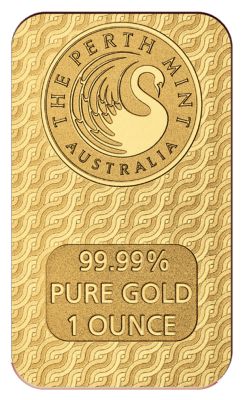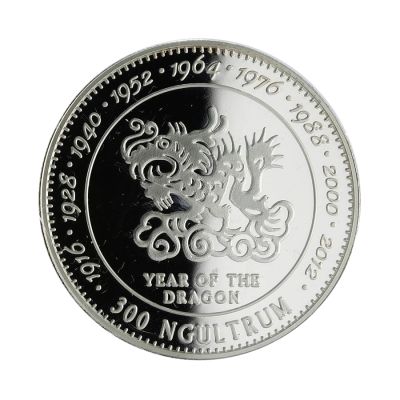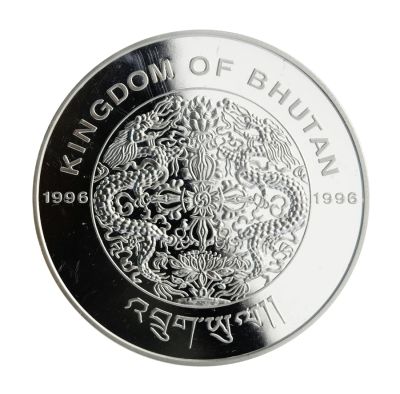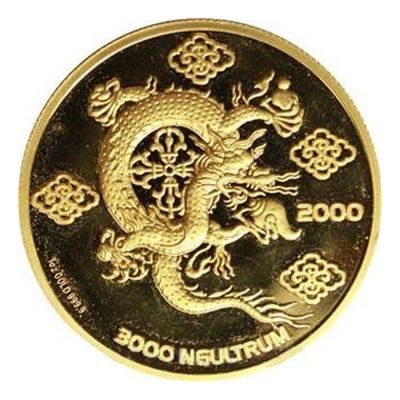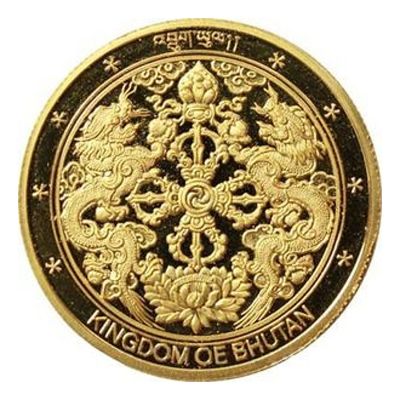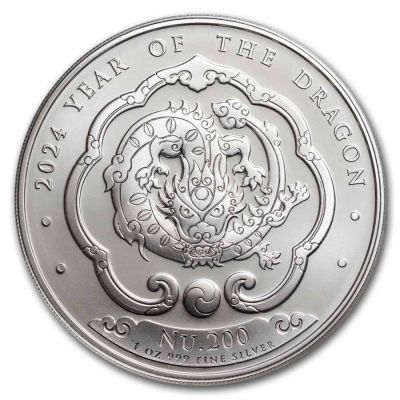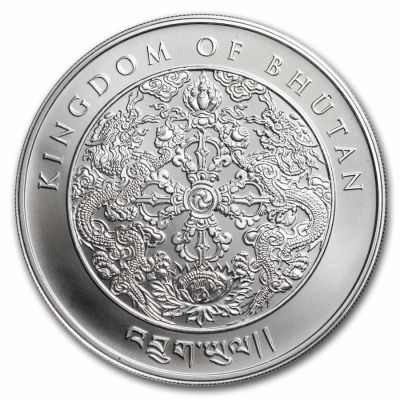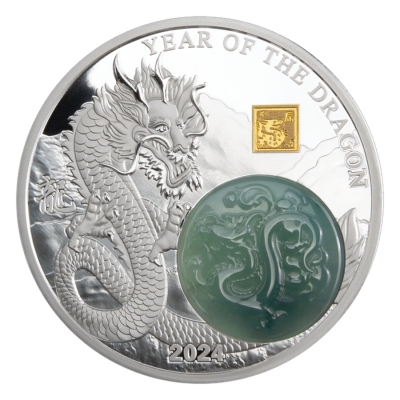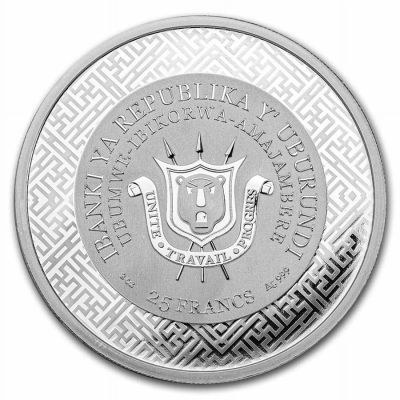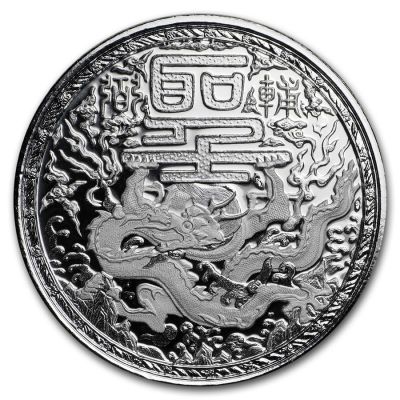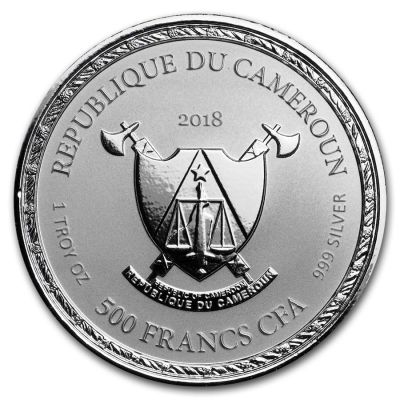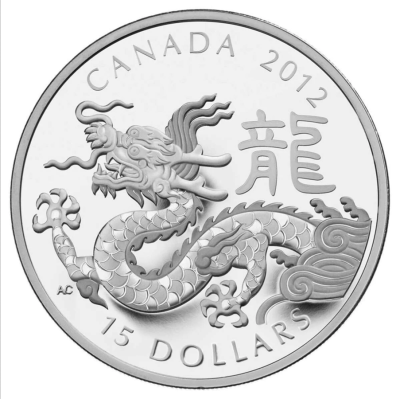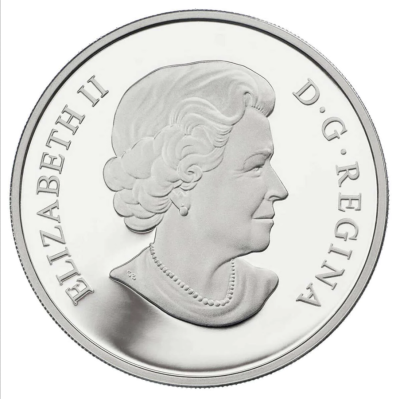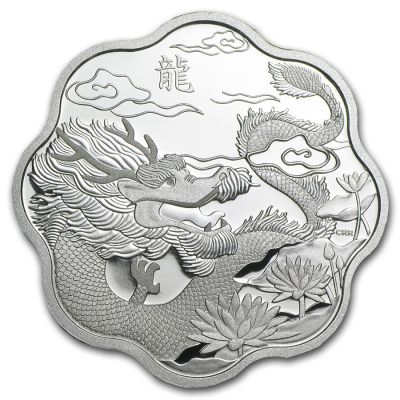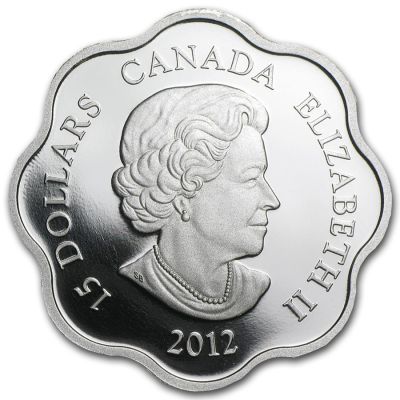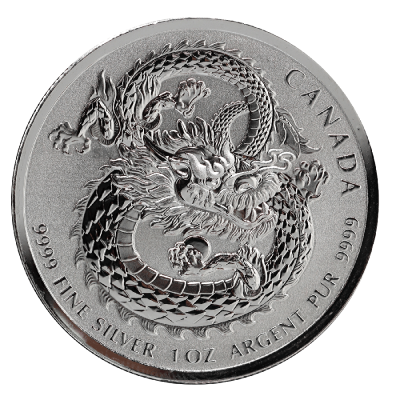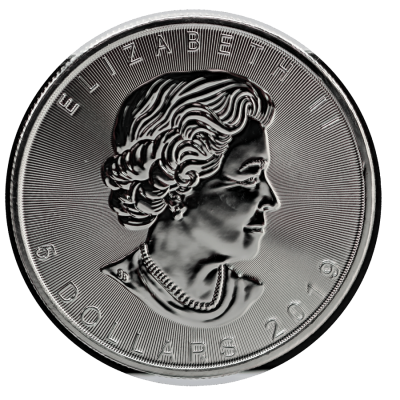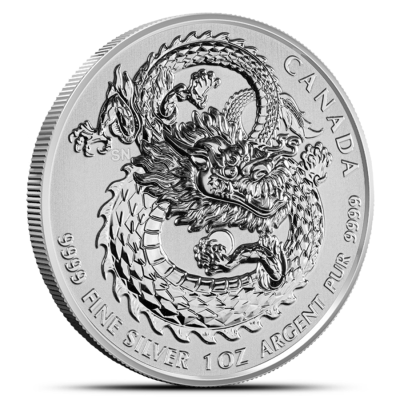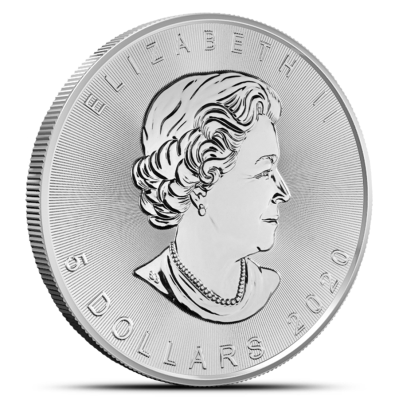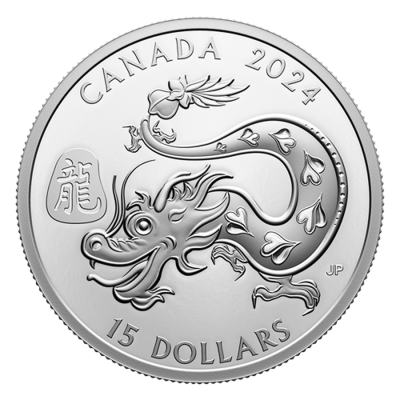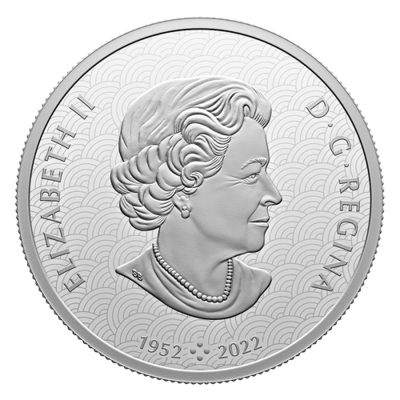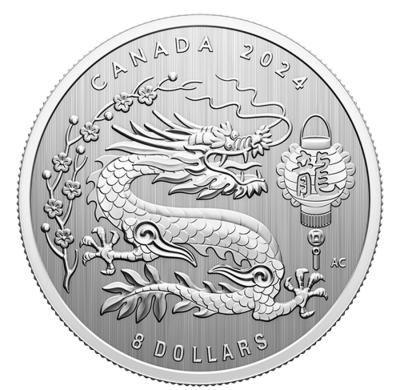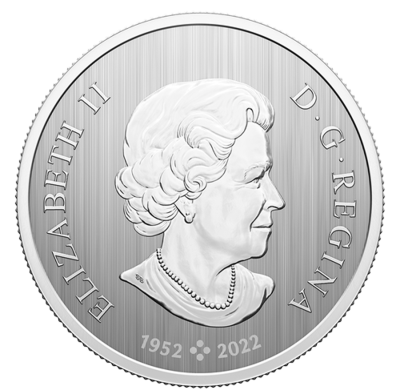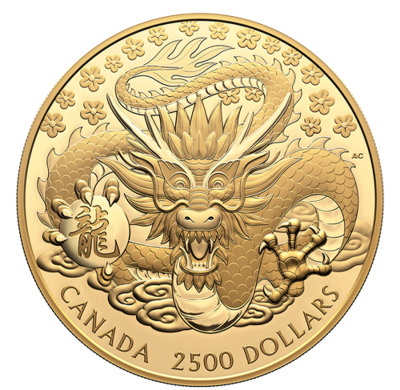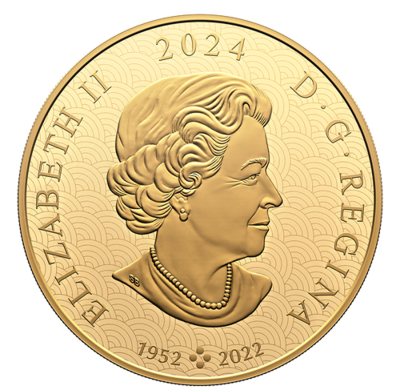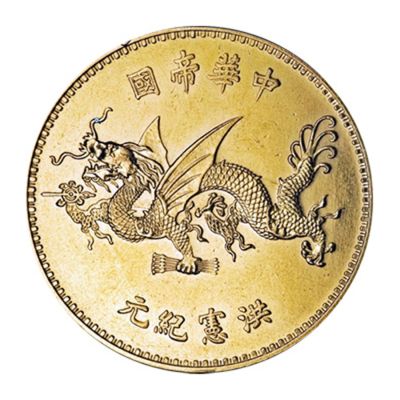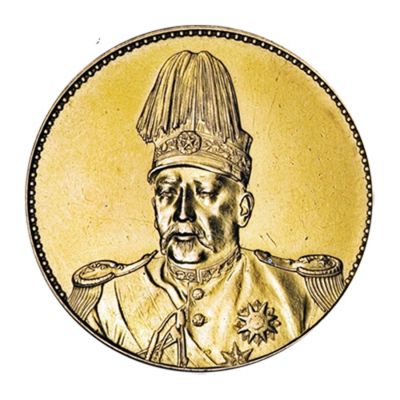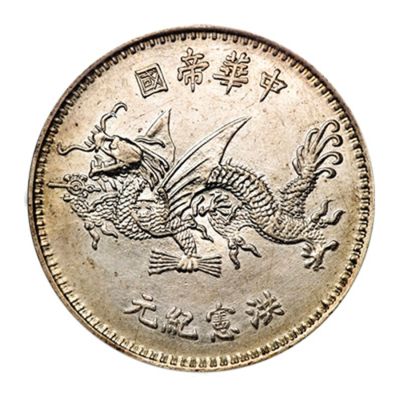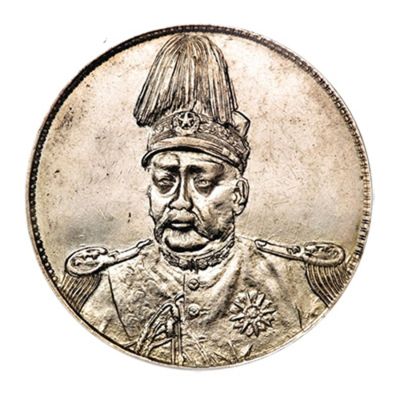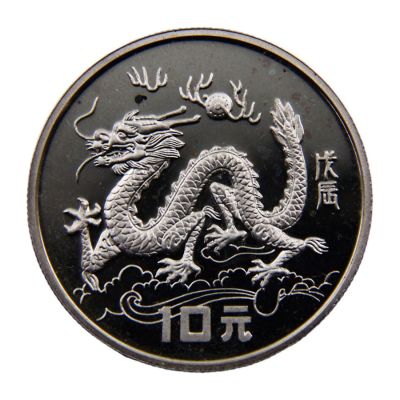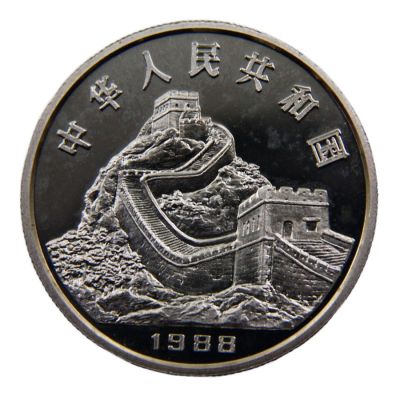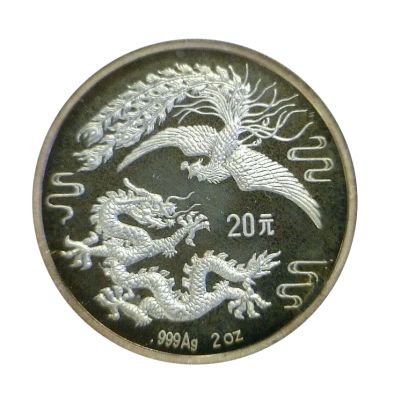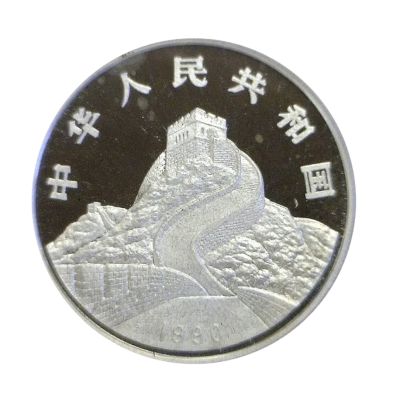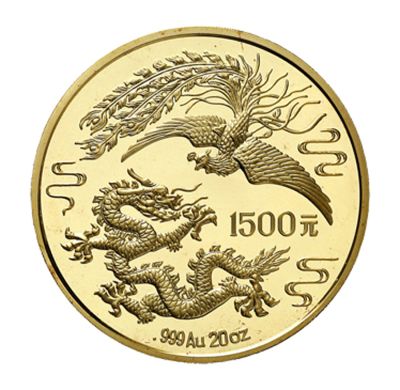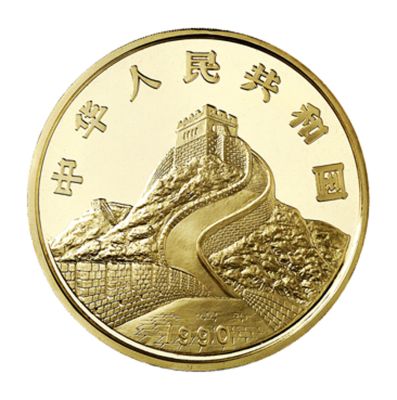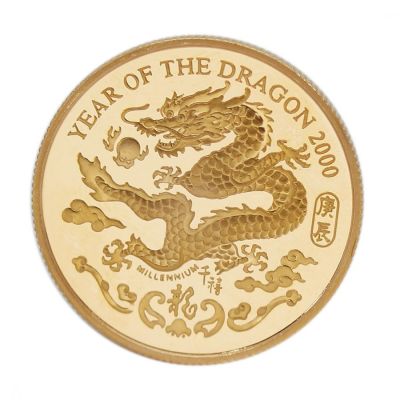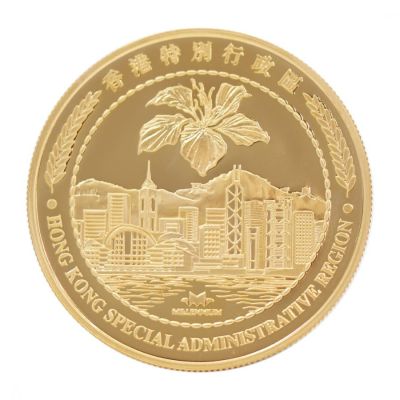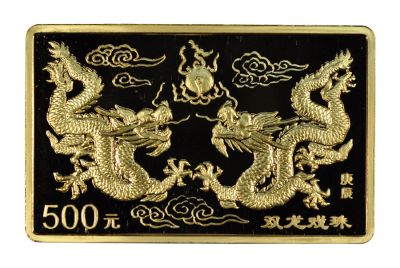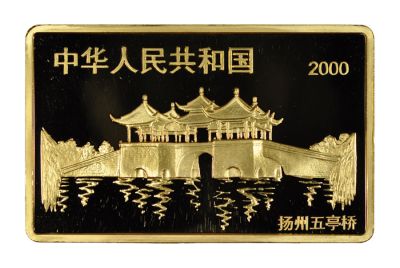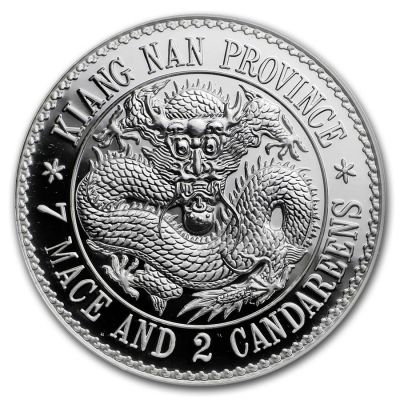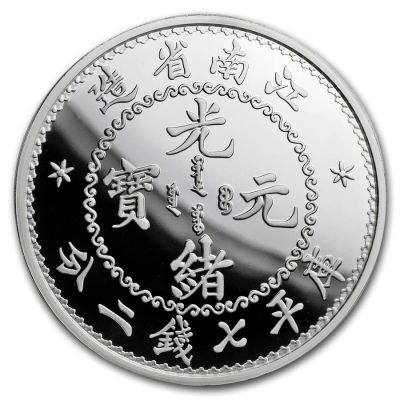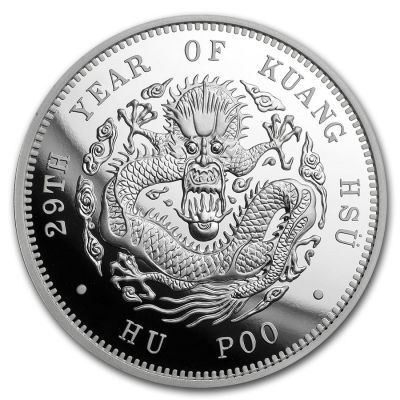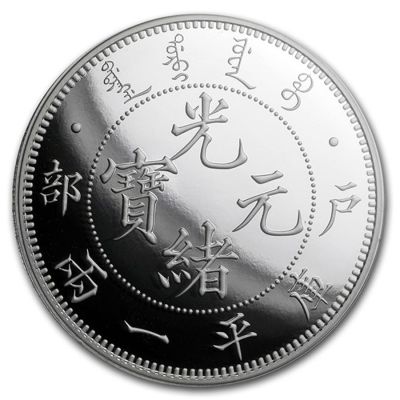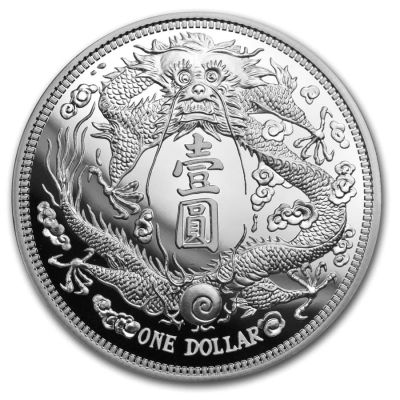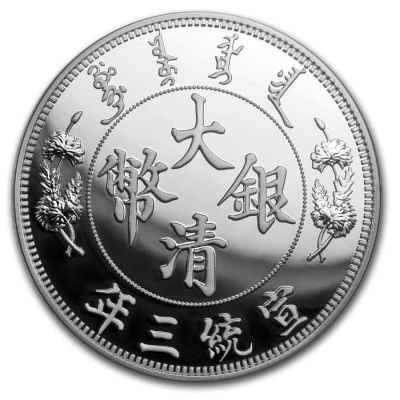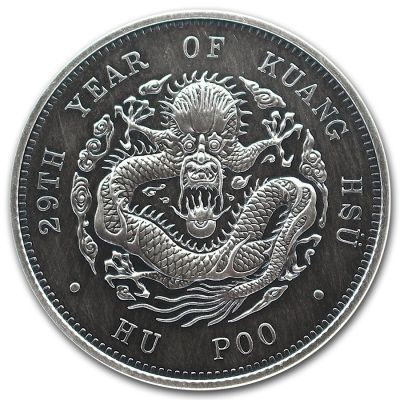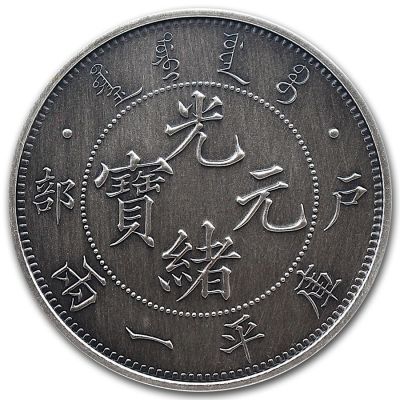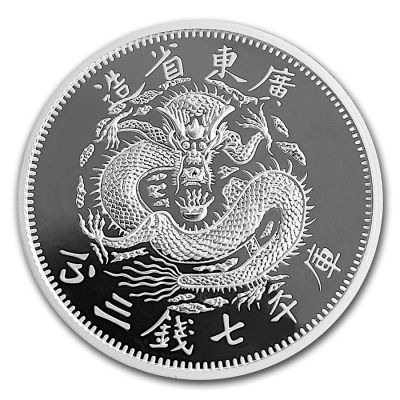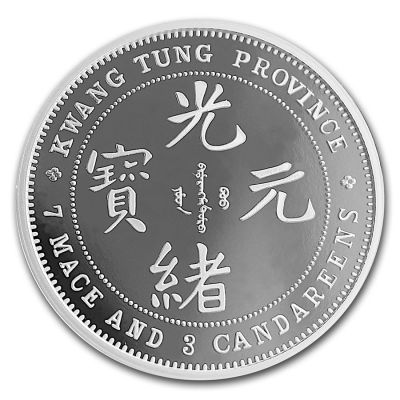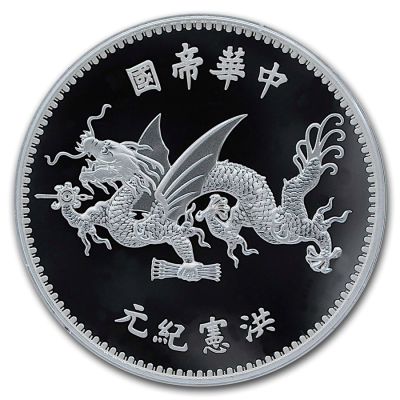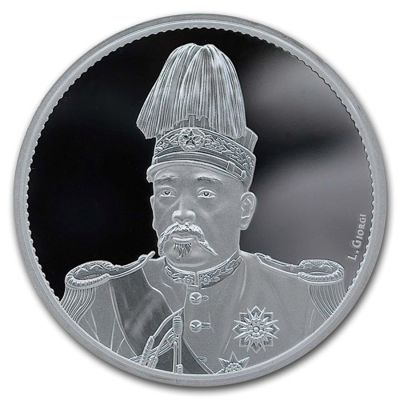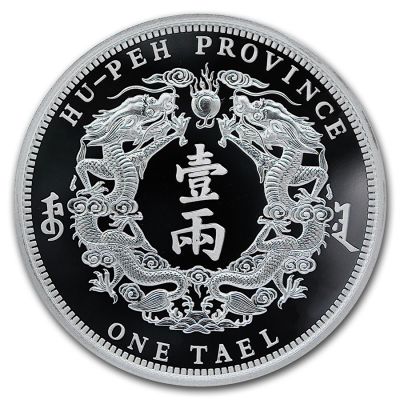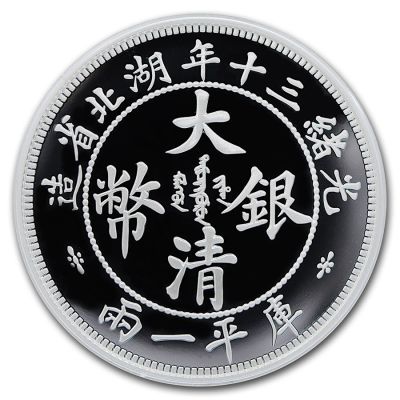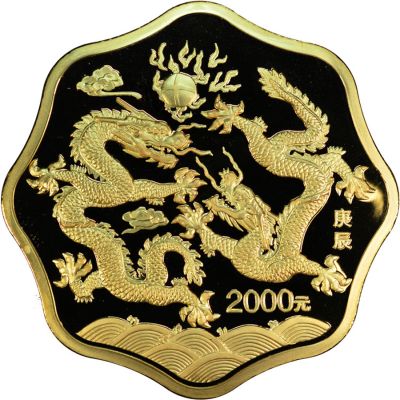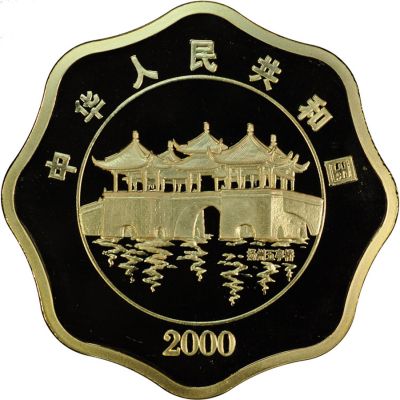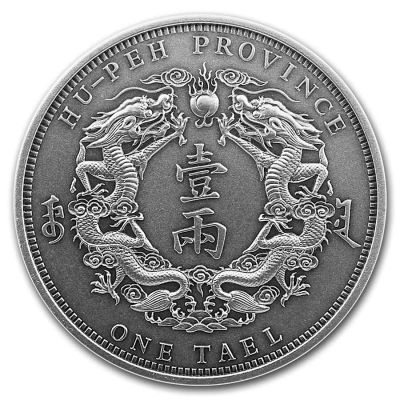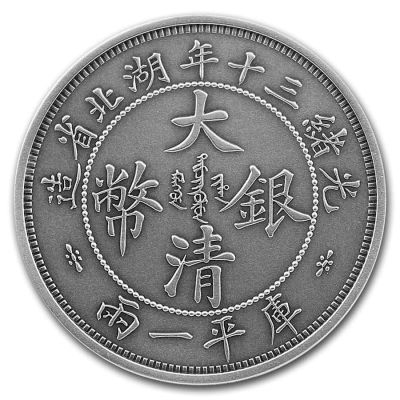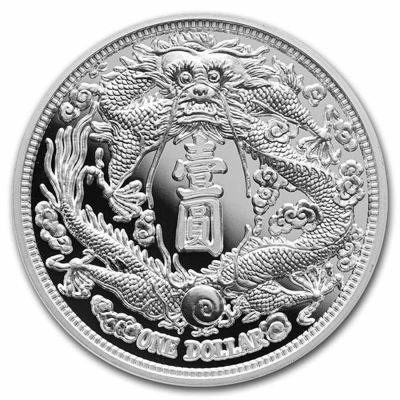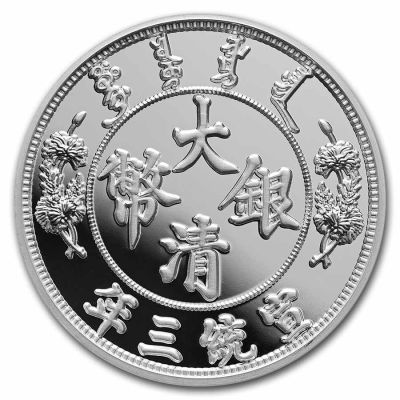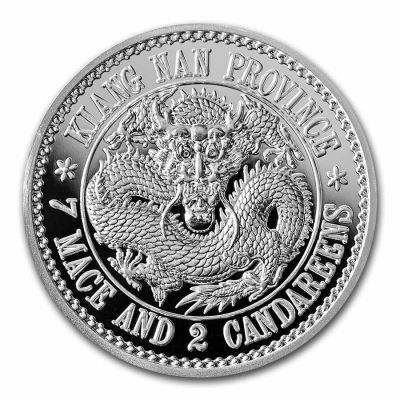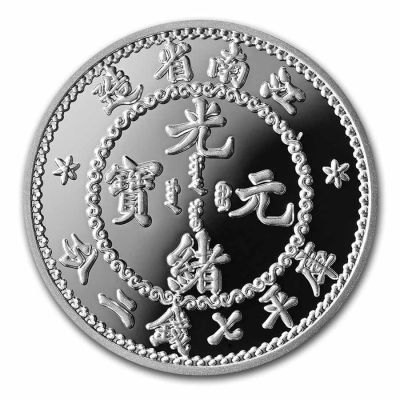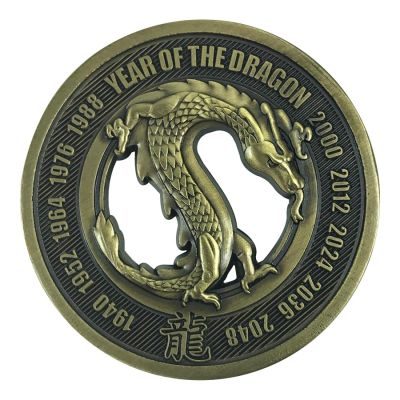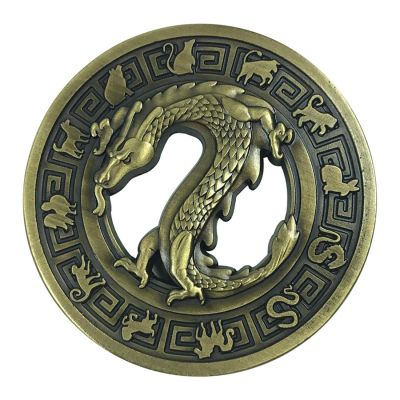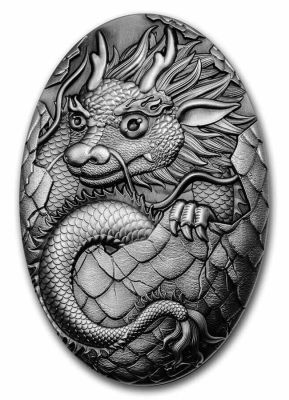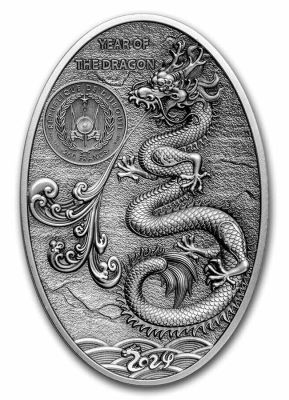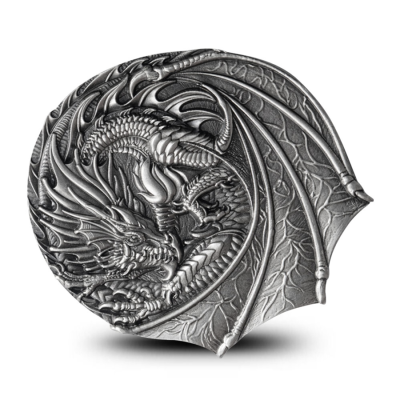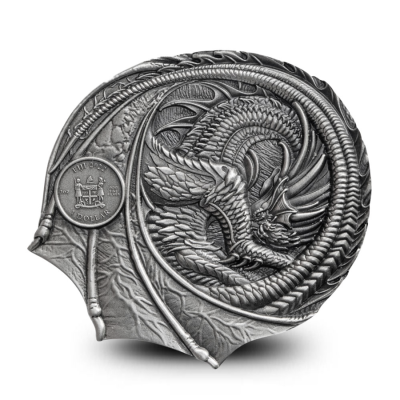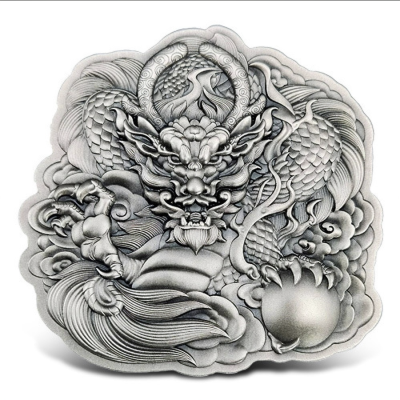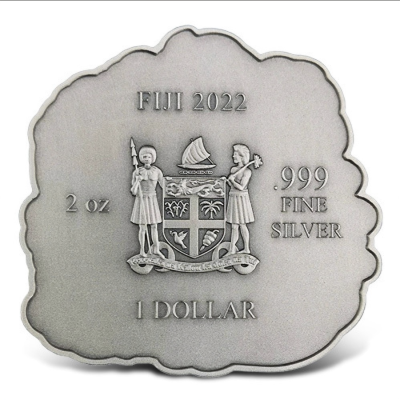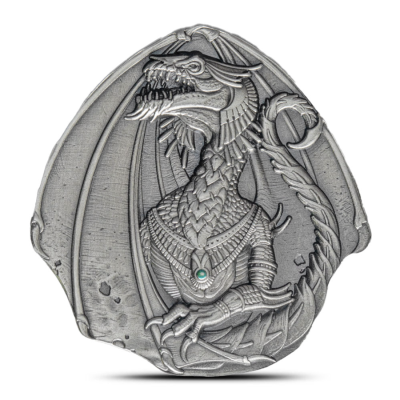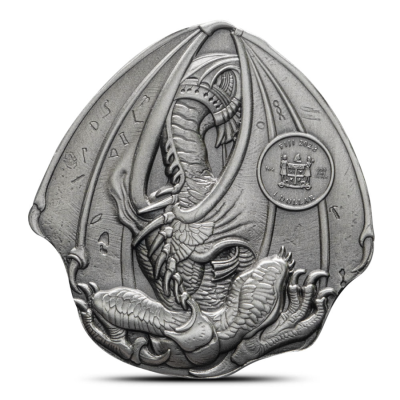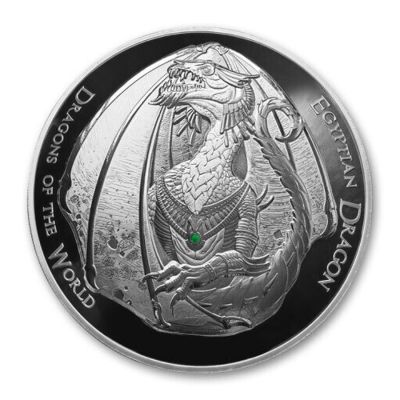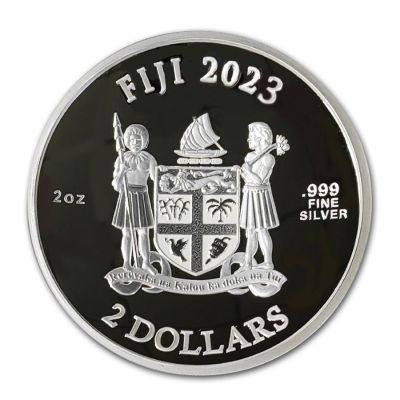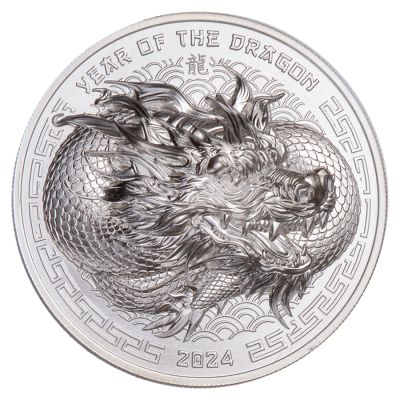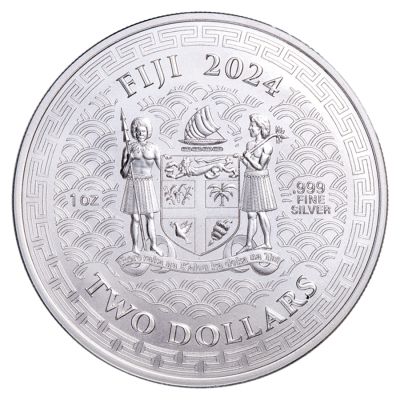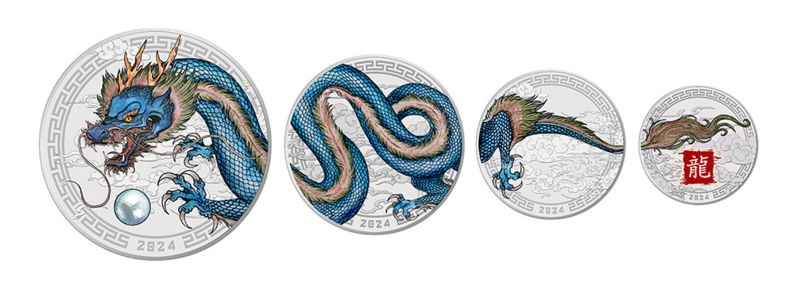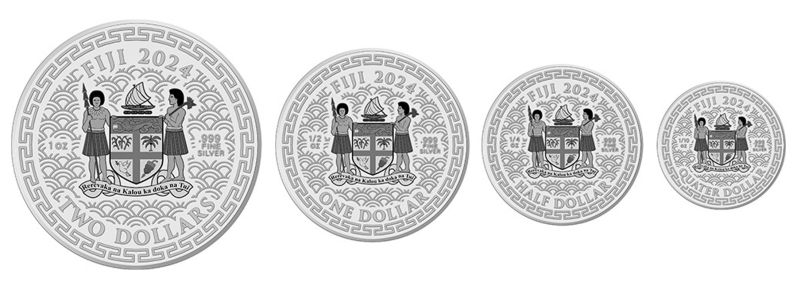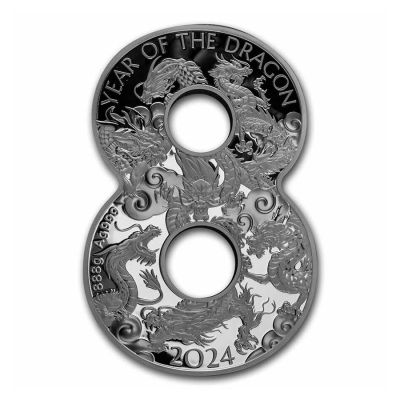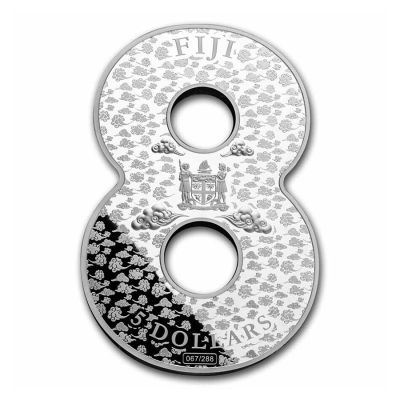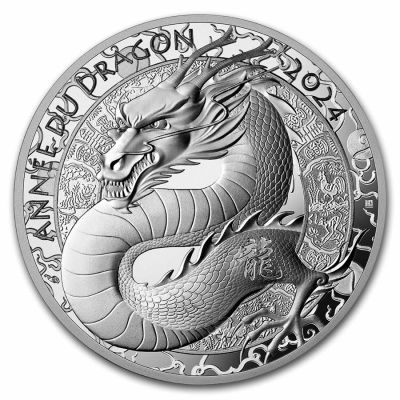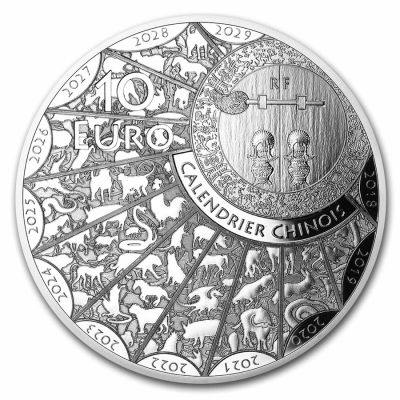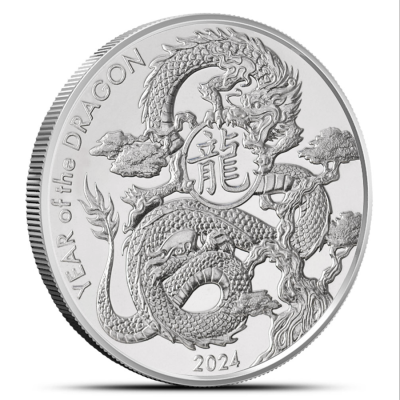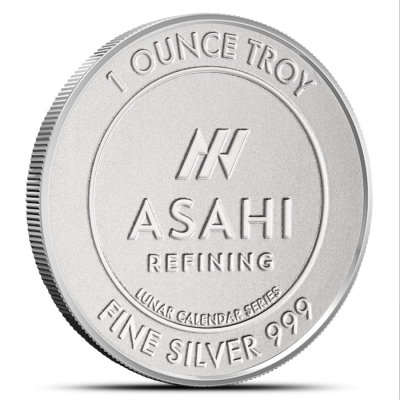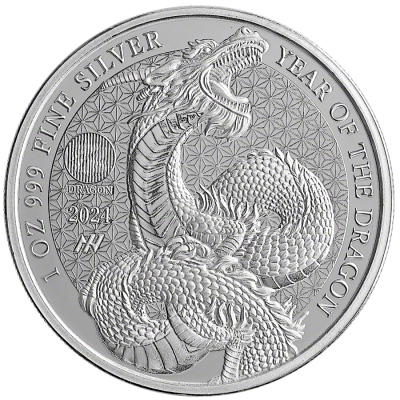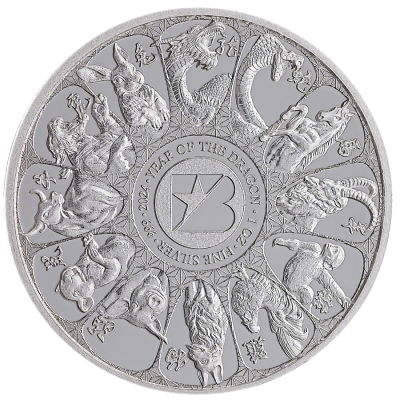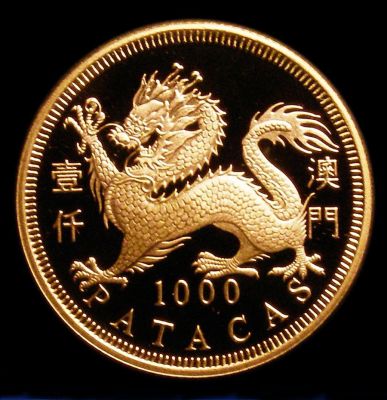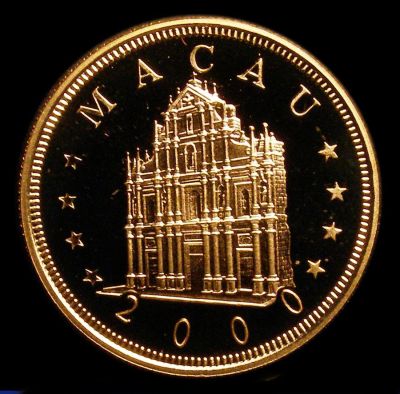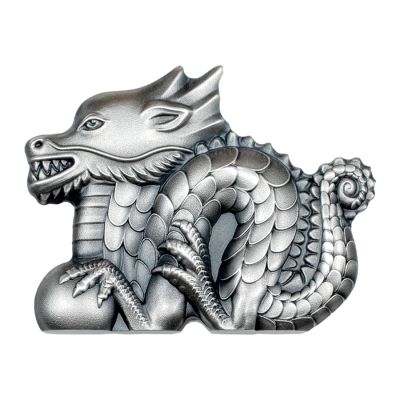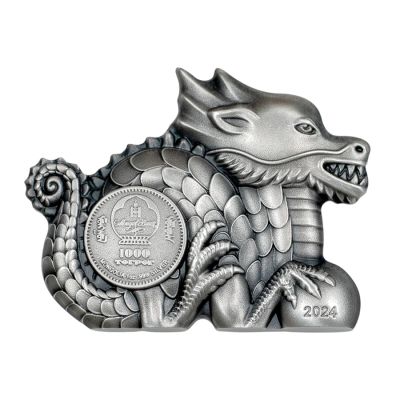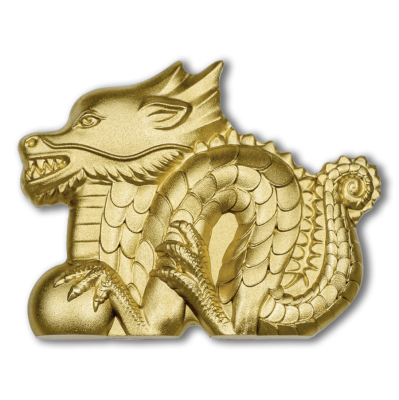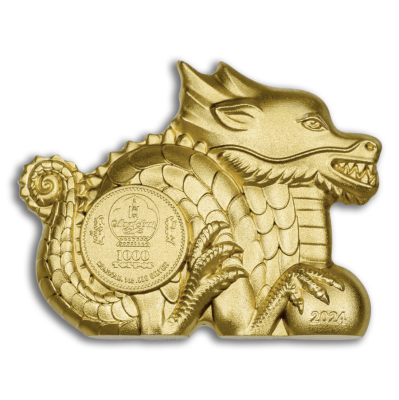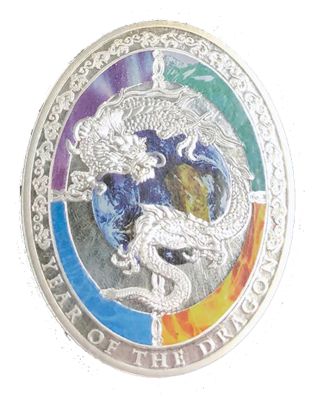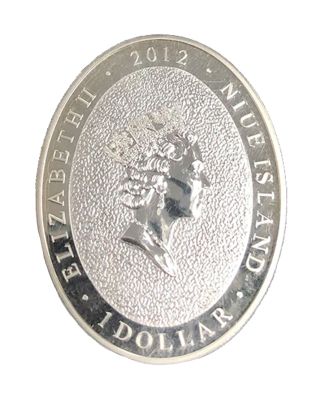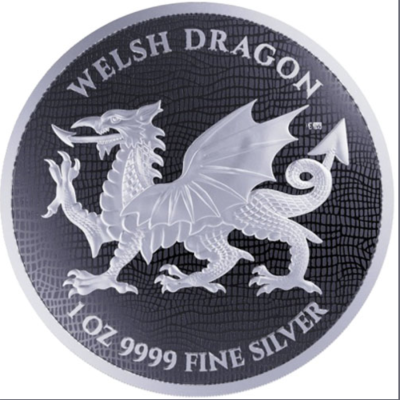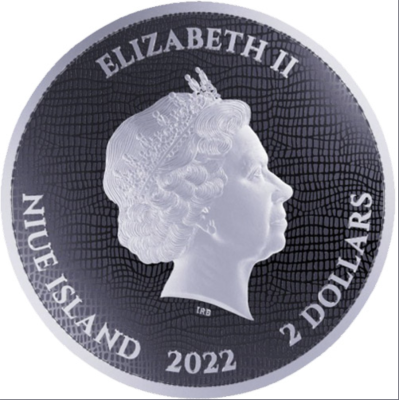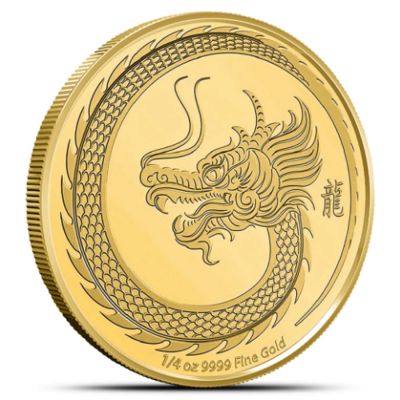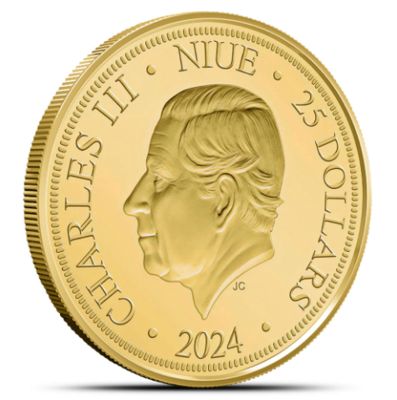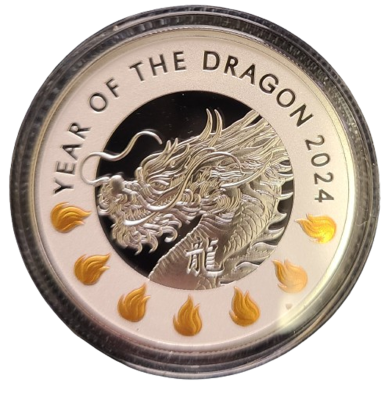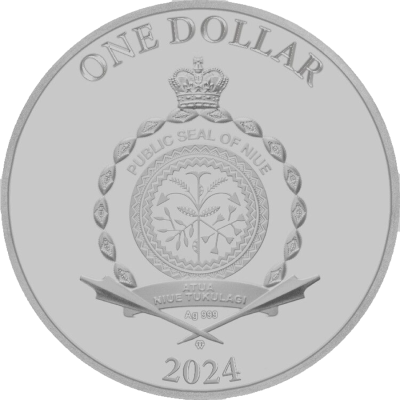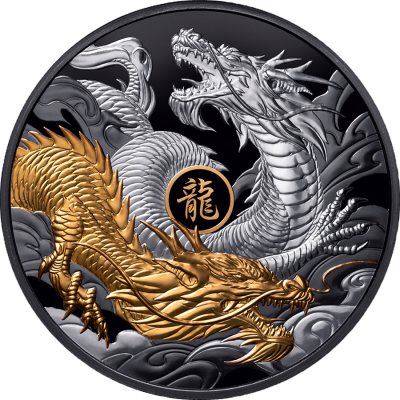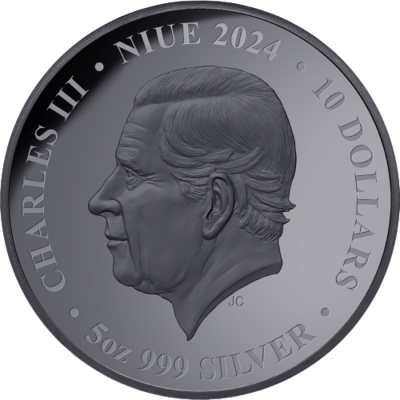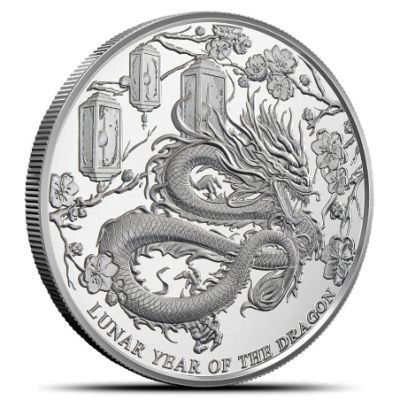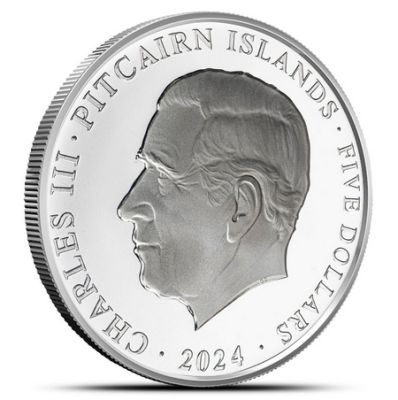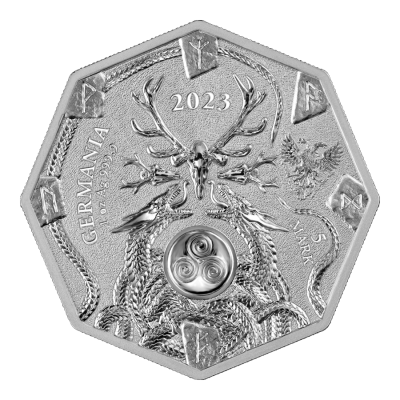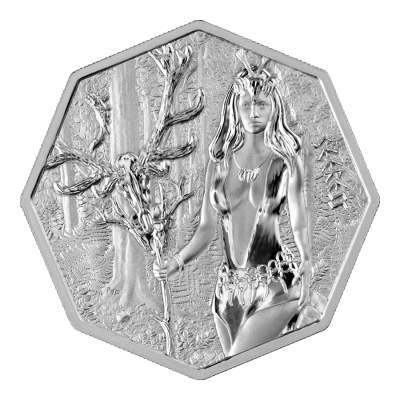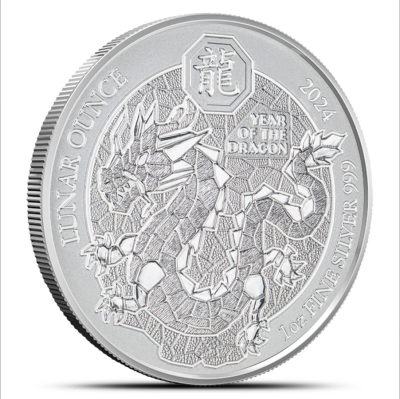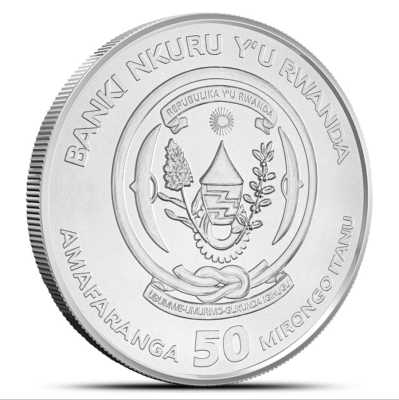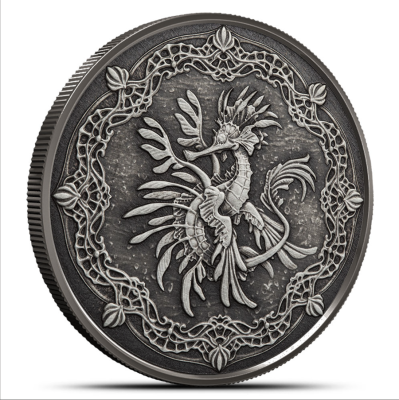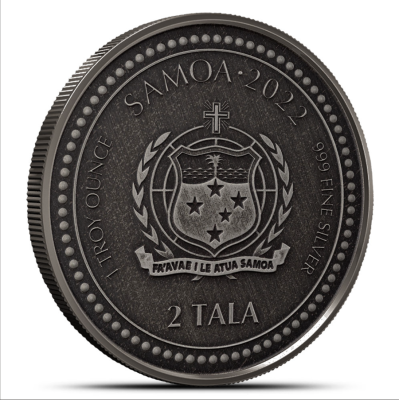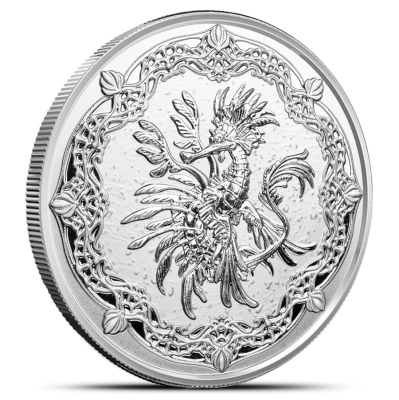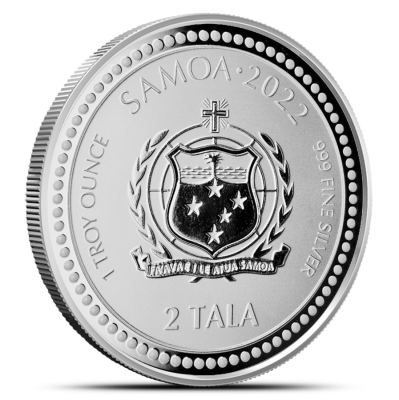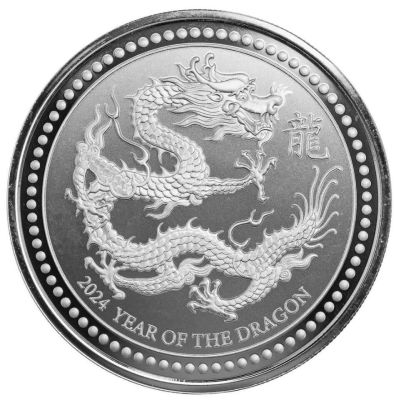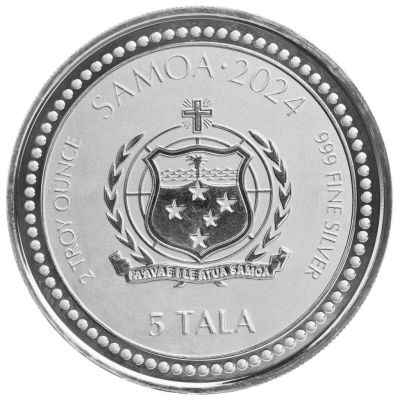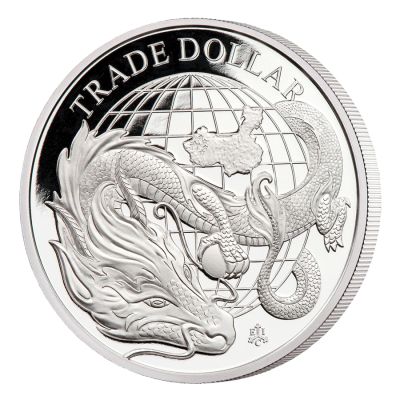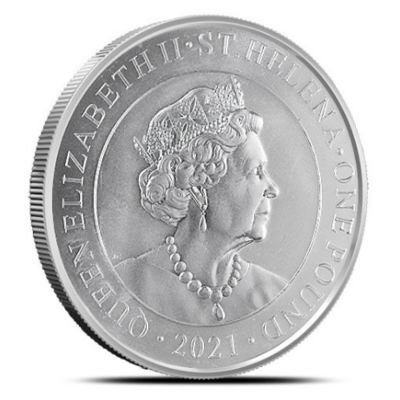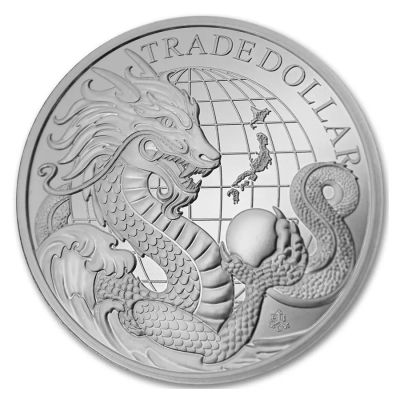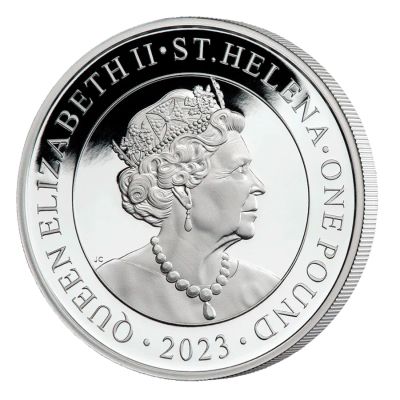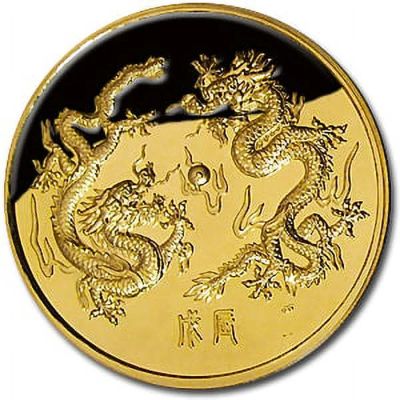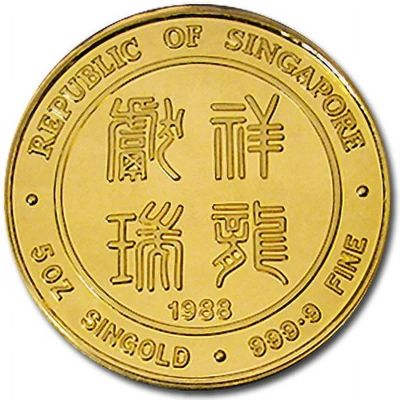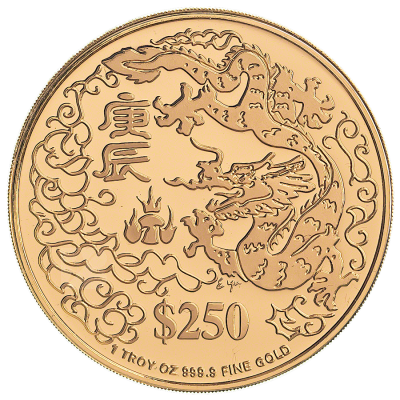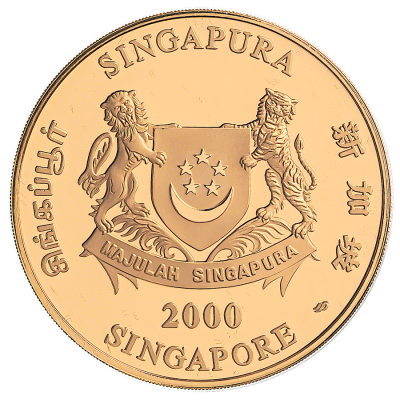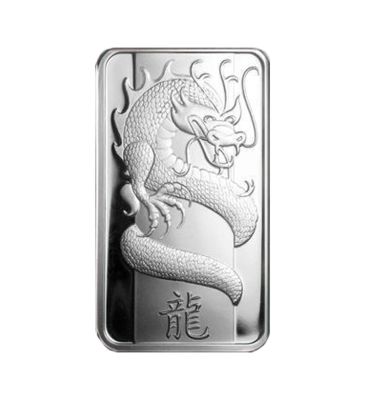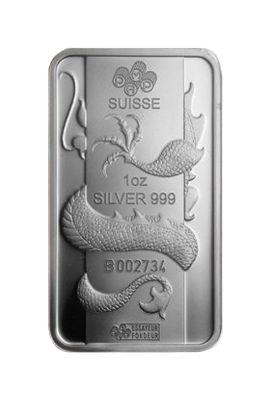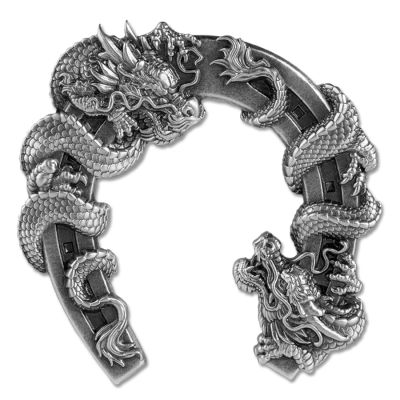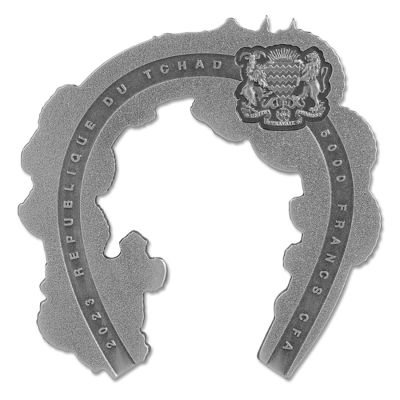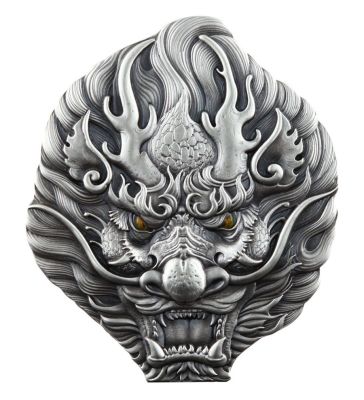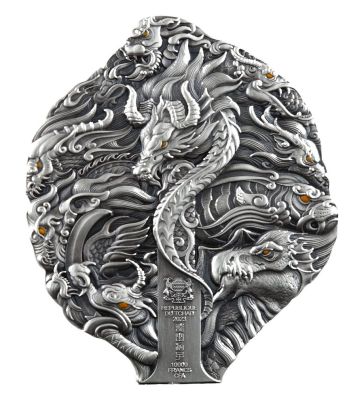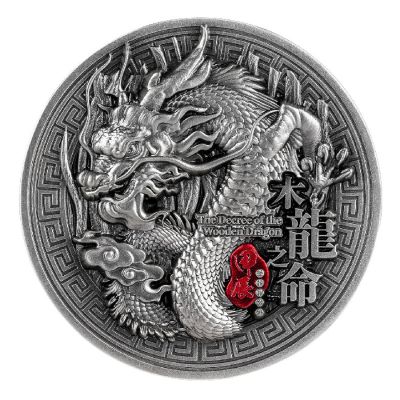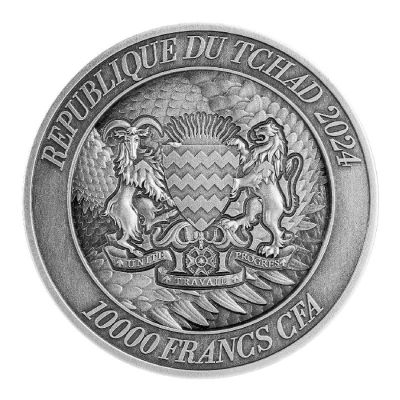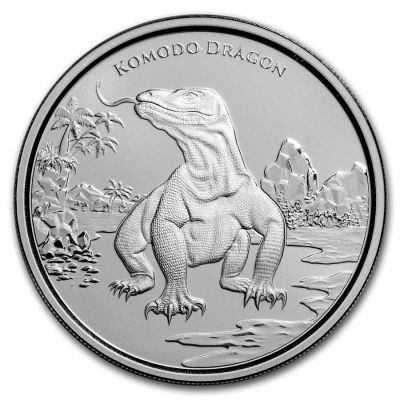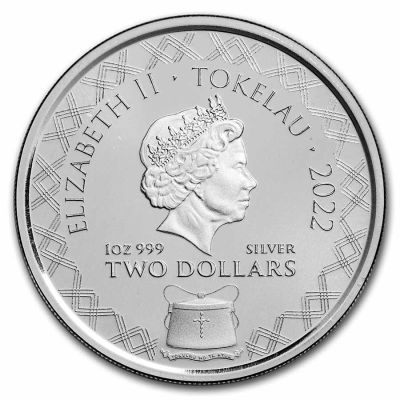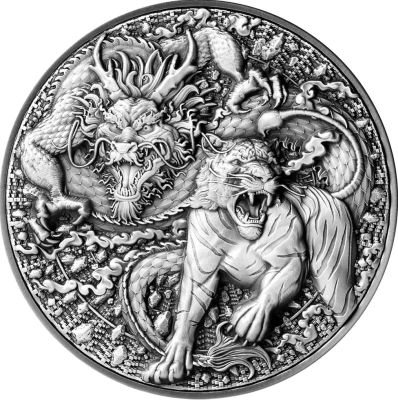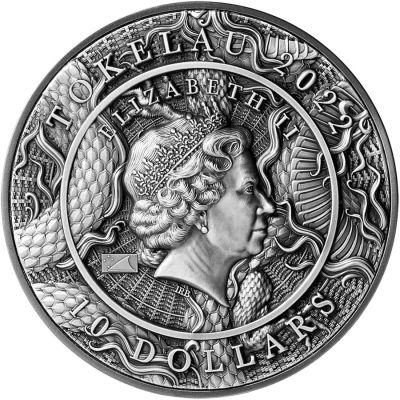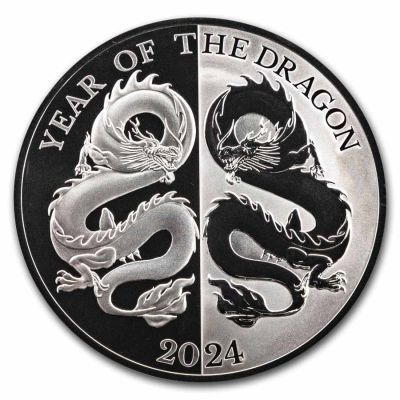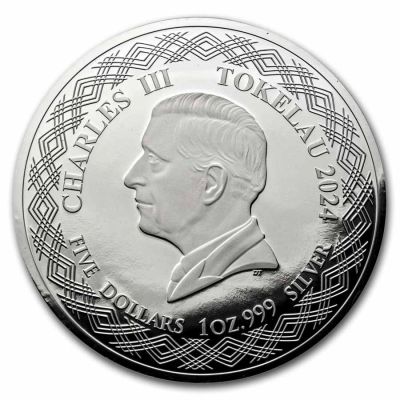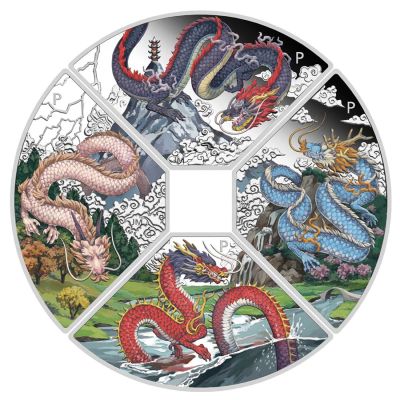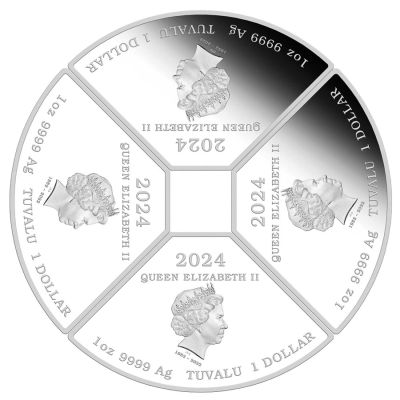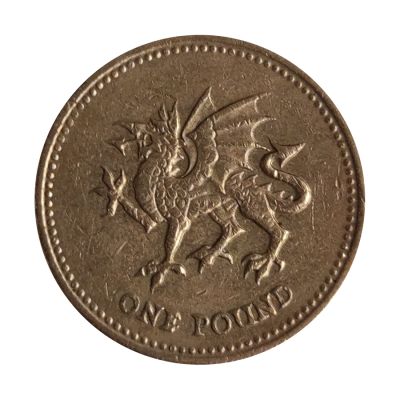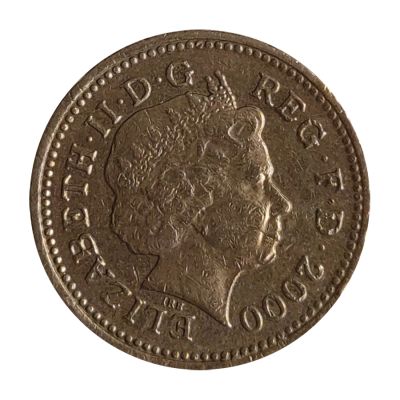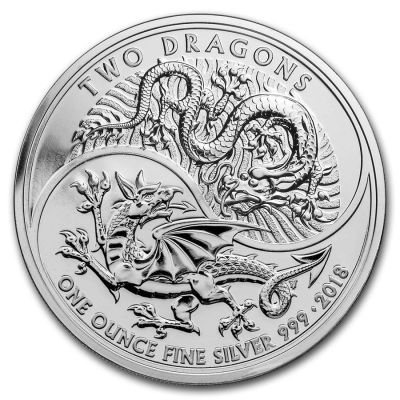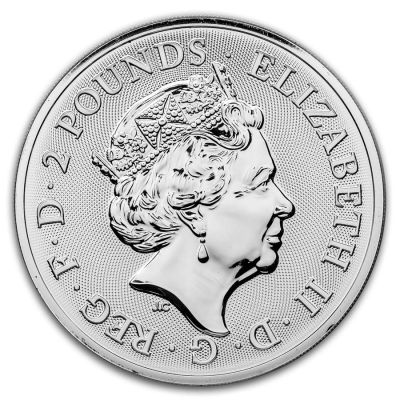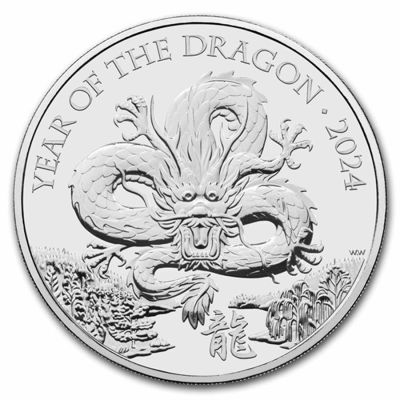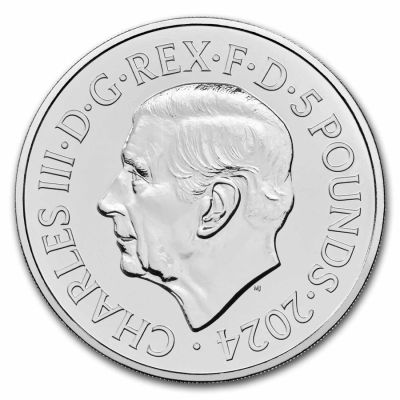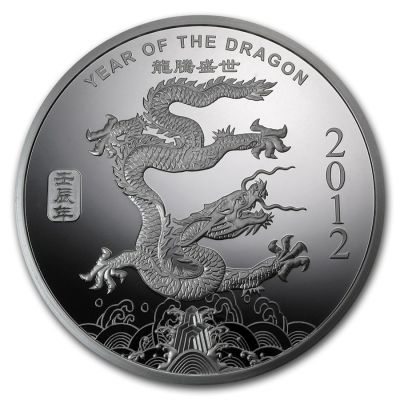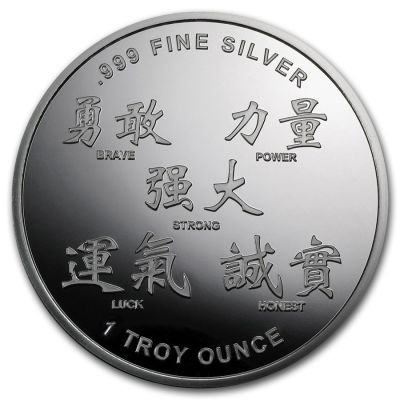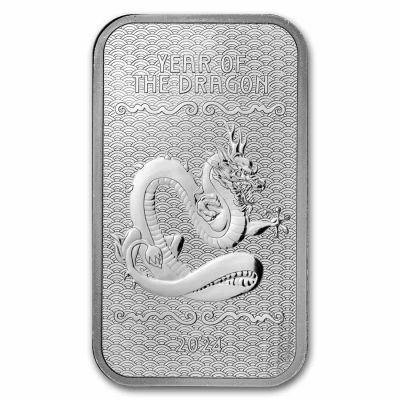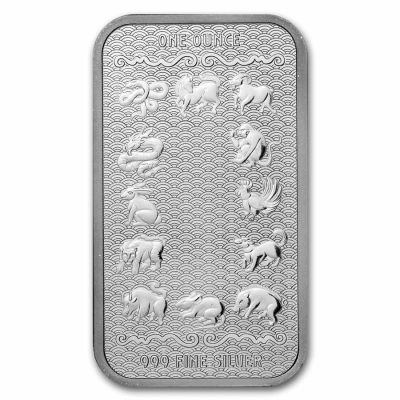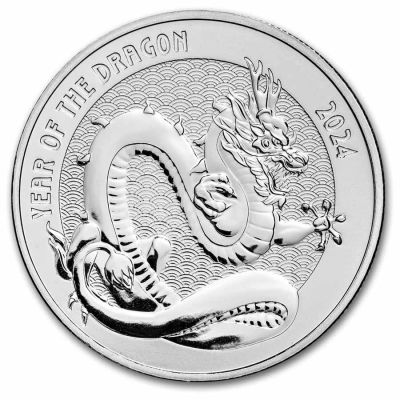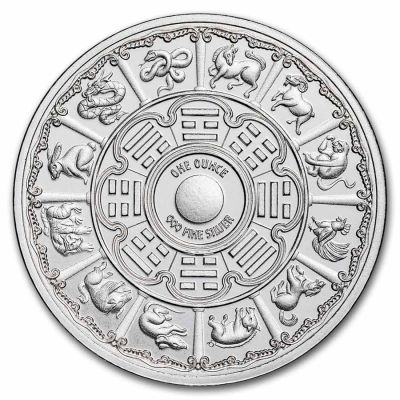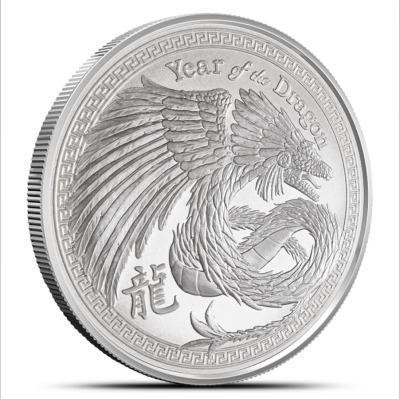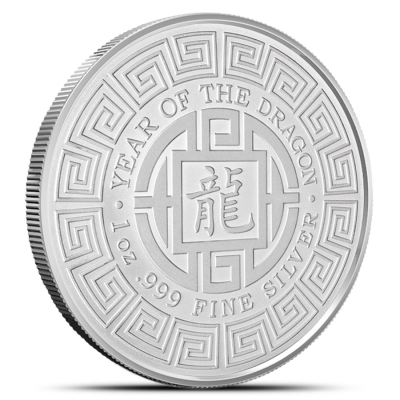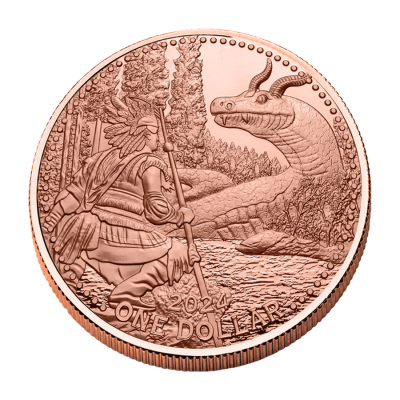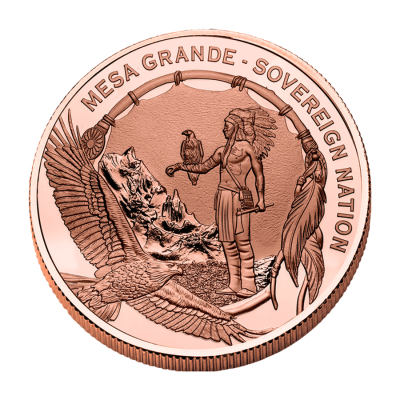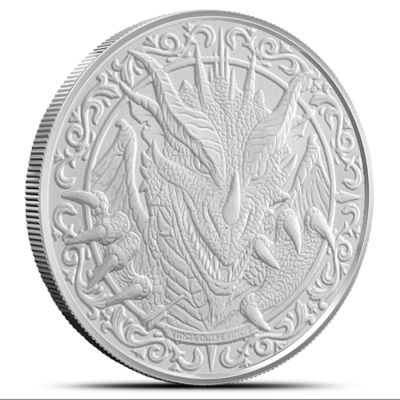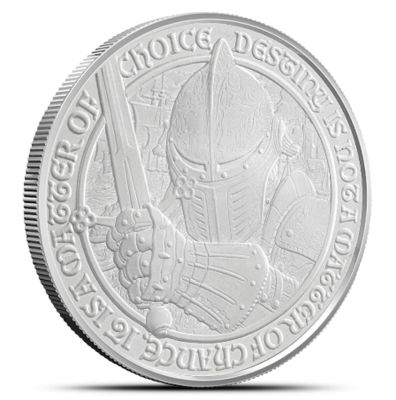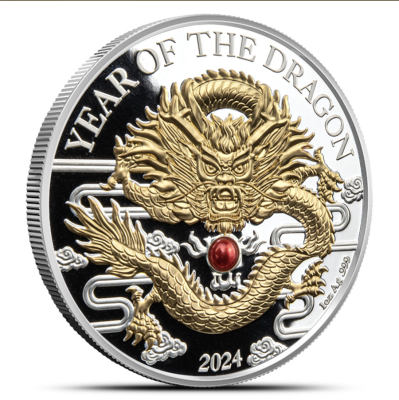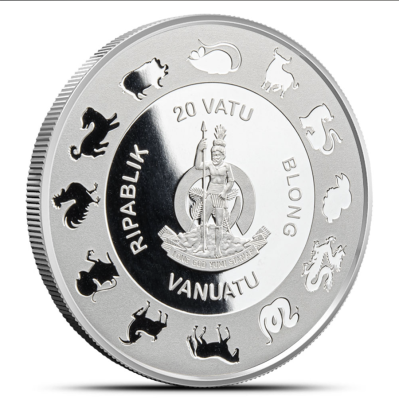Dragon Money: Difference between revisions
(→2021: typo fix) |
(moving numismatic stuff to coins and tokens cat) |
||
| Line 159: | Line 159: | ||
Meanwhile, in European nations with their own traditions of Dragons which are not connected to astrology, heraldic Dragon coins may be issued at any time. | Meanwhile, in European nations with their own traditions of Dragons which are not connected to astrology, heraldic Dragon coins may be issued at any time. | ||
<!--== How the Dragon Money is Organized on This Page == | <!--== How the Dragon Money is Organized on This Page == | ||
Revision as of 01:02, 16 February 2024
In this installment of "Your Wate and Fate," we share a page that was funded by our Patrons for display to the public. Patreon supporters have access to our pages before the public does.
- * Dragon Money Part One: Patreon Release Date: January 28th, 2024.
- * Dragon Money Part One: Public Release Date: February 7th, 2024.
- * Dragon Money Part Two: Patreon Release Date: February 7th, 2024.
- * Dragon Money Part Two: Public Release Date: February 7th, 2024.
- * Dragon Money Part Two: Patreon Release Date: February 14th, 2024.
- * Dragon Money Part Two: Public Release Date: February 14th, 2024.
Please tell your friends that they can subscribe to my Patreon stream for $2.00 per week:
To discuss this and other Your Wate and Fate pages with me, join my private Patreon Forum here:
Support Your Wate and Fate
All of the material you have access to here — the instructive booklets, the nostalgic postcards, the boldly graphic ephemera, and all of the historical information researched and shared from the mind of the woman who is making it all happen — can easily fit into one 8 x 10 foot room in an old Victorian farmhouse, but you would never see it without the investment of the time it takes to produce such a site and the caloric input such a site requires in the form of food for the writer, graphic designer, and database manager, as well as the US currency needed to pay for the computers, software applications, scanners, electricity, and internet connectivity that bring it out of that little room and into the world. So, as you can see, this site is the darling of many, and it is growing at a rapid rate ... but although it is "free," there also is a cost. Your financial support underwrites this cost.
Each new web page or sample pdf is circulated to Patrons as an unpublished galley proof or advance copy. After one year access for Patrons, each web page will be released to the public, while book pages will be available to the public as printed books, and copies will be sent to Patrons who subscribe at the upper two tiers.
Patrons have access to a Private Patreon sub-forum within the Lucky Mojo Forum, and will be accorded special Red Star Avatar badges at the Forum.
Dragon Money
by nagasiva yronwode and catherine yronwode
On this page we reveal a spectacular and detailed collection of Dragon Money, compiled in honour of the Lunar New Year Festival on February 10th, 2024, which is celebrated all around the world as the auspicious Year of the Dragon begins. Dozens of nations have chosen this time to issue lucky silver, gold, and copper coins and bullion displaying images of talismanic Asian dragons to mark an event that only happens every 12 years. We have gathered more than 80 different dragon coins from the past and present for your enjoyment, and added a quick guide to coin collecting for anyone who is new to the hobby and wants to start with Dragon Coins. Our Patrons usually get a one-year exclusive preview of our work documenting the material culture of magic and luck, but this time the whole world has been invited to click the link and share in the lure and lore of precious metal Dragon Money!
The Dragon
The Dragon is generally described as a mythical beast, a sort of fantasy creature, varying in appearance by region, and imagined out of bits and pieces of snakes, lizards, crocodiles, fishes, bats, sea-horses, lions, and what-have you. Some scholars, however, believe that Dragons were never conceived of as "mythical," but rather that they represent early, pre-scientific encounters that humans had with fossilized dinosaurs.
This theory accounts for the fact that Dragons of various types appear in far-apart areas of the world, and that there are, in a sense, "regional" Dragons in art. The variations in Dragon appearance may reflect an honest attempt by early humans to reconstruct some sort of uniform saurian anatomy from the fragmentary fossils of many species in their own areas -- long-necked, short-necked, gracile, stocky, winged, unwinged, swimming, flying, and terrestrial -- and this, after millennia, has resulted in the variability of Dragons in art.
The European Dragon
The European Dragon is a reptile, generally depicted as a heavy-bodies terrestrial beast capable of short bursts of flight by means of long-fingered, webbed wings. European Dragons may have two feet and two wings, but a good many of them have six appendages -- four feet and two wings, making them look like the curator of the paleontology department had a few two many whiskies before he assembled their skeletons.
The European Dragon in Heraldry
Unlike the Asian Dragon, which knows no bounds in terms of posture or position, the European Dragon is often encountered in heraldry, which is an ancient, pre-literate, and highly formalized system for branding and identifying the coat of arms or shield of individuals, or their land holdings, municipalities, provinces, or nations by association with animals, plants, and other devices. Heraldry is so popular in Europe, and especially Great Britain, that its use has been extended in popular culture to the branding of taverns, inns, and commercial businesses of all kinds.
Because heraldry is so formalized in terms of each device's position, colour, and number, European Dragons tend to be shown in profile and they are less expressive than Asian Dragons, but they make up for this in terms of their beloved status as totemic emblems of certain regions and their citizenry.
The Jersey Devil
The Jersey Devil originated in the Pine Barrens of New Jersey in the United States about 250 years ago. It closely resembles the European Dragons of the colonists who first described it, with a substantial body and four feet -- sometimes those of a horse or a goat, but sometimes goat-hooved at the rear and Dragon-clawed at the front. It has a pair of European Dragon wings, and the head of a horse, with long, back-swept goat horns. It is usually shown rearing up on its hind legs, like a horse or a goat.
The American Horned Serpent
The Horned Serpent is a saurian genus found in the histories and story-telling of many indigenous American tribes. Unlike the actual Horned Viper of Africa, these animals have a pair of elaborate horns -- sometimes Goat-like, sometimes Deer-like -- on their heads. They live in lakes and they are the size of large trees, so it is easy enough to see in them a description of fossilized aquatic dinosaurs. Their images can be found on rock art and in pottery designs throughout the United States, especially among the Southeastern Woodlands and Great Lakes tribes.
To the Muscogee people, Horned Serpents were underwater snakes covered with iridescent, crystalline scales and a large crystal on their foreheads. The Alabama people gave them the name Tcinto Såktco ("Crawfish Snake"). The Iroquois people told tales of a Horned Serpent named Djodi'kwado'. The Chickasaw called them Sishtahollo' ("Holy Snake"). The Sioux called them Unhcegila and described them as dangerous reptilian water monsters which lived in ancient times and were destroyed by the Thunderbirds (possibly Pterosaurs) until all that remained of their kind were small snakes and lizards. The Yuchi people of Tennessee, who were later forced to relocate to Oklahoma, made effigies of Horned Serpents from stuffed deer hides painted blue, with the antlers painted yellow. The Ojibwe and Chippewa tribes told stories of Manoominikeshiinh, the great Horned Serpents who lived in the depths of Lake Superior.
The best-known Native American Horned Serpent is the Cherokee Uktena. The anthropologist James Mooney described it as "a great snake, as large around as a tree trunk, with horns on its head, and a bright blazing crest like a diamond on its forehead, and scales glowing like sparks of fire. It has rings or spots of color along its whole length, and can not be wounded except by shooting in the seventh spot from the head, because under this spot are its heart and its life. The blazing diamond is called Ulun'suti ("Transparent") and he who can win it may become the greatest wonder worker of the tribe."
The Plumed Serpent
A relative of the North American Horned Serpent is the Plumed or Feathered Serpent of Mexico and Guatemala. As the Aztecs and Mayans describe it, this dragon bears feathers on its head and may sport feathered wings. The most famous feathered serpent is Quetzalcoatl, the god of wind and rain. As with other dragons, he seems to be a dinosaur, and this is all the more remarkable because it wasn't until the 21st century that modern paleontologists realized that many dinosaurs were feathered, just like birds, and that birds are, in fact, very small remnant dinosaurs.
The Asian Dragon
The Asian Dragon, a sinuous, reptilian beast, is revered as a religious, mythical, astronomical, and astrological figure. This Dragon may be associated with water, or may writhe through the sky. It usually has four feet and no wings. It may have whiskers or fish-like barbels on its face, and emit flames from its mouth.
The role of the Asian Dragon, his guardianship of a precious flaming pearl, and his titular rulership of every 12th year of the Chinese zodiac are well known, even to non-Asians. If nothing more, they will encounter the Dragon on Chinese restaurant menus, where he stands out because he shares a spot on the Lunar New Year cycle with eleven other animals, all of whom are identifiable living species, while he is a creature of spiritual origin.
The Asian Dragon in Chinese Astrology
Asian Astrology, popularly known in Europe and America as Chinese Astrology, is a traditional system of determining a person's personality, characteristics, and destiny via a twelve-year cycle of animal signs, known as the Chinese Zodiac.
Each Chinese Zodiac sign begins at the New Moon that opens the Chinese New Year or Spring Festival, which is a variable date between January 21st and February 20th) and for the rest of the year its animal holds the luck of the year. The twelve animals of the Chinese Zodiac are, in order: the Rat, the Ox, the Tiger, the Rabbit, the Dragon, the Snake, the Horse, the Sheep (sometimes referred to as the Ram or Goat), the Monkey, the Rooster, the Dog, and the Boar (also known as the Pig).
Each year is named after one of the twelve lucky Chinese Zodiac animals, and, as with other forms of astrology, people born under these signs have certain personality traits.
- * Rat: 1924, 1936, 1948, 1960, 1972, 1984, 1996, 2008, 2020: Resourceful, versatile, kind.
- * Ox: 1925, 1937, 1949, 1961, 1973, 1985, 1997, 2009, 2021: Strong, dependable, determined.
- * Tiger: 1926, 1938, 1950, 1962, 1974, 1986, 1998, 2010, 2022: Brave, confident, competitive.
- * Rabbit: 1927, 1939, 1951, 1963, 1975, 1987, 1999, 2011, 2023: Quiet, elegant, responsible.
- * Dragon: 1928, 1940, 1952, 1964, 1976, 1988, 2000, 2012, 2024: Confident, intelligent, enthusiastic.
- * Snake: 1929, 1941, 1953, 1965, 1977, 1989, 2001, 2013, 2025: Mysterious, intelligent, wise.
- * Horse: 1930, 1942, 1954, 1966, 1978, 1990, 2002, 2014, 2026: Animated, active, energetic.
- * Goat: 1931, 1943, 1955, 1967, 1979, 1991, 2003, 2015, 2027: Calm, gentle, sympathetic.
- * Monkey: 1932, 1944, 1956, 1968, 1980, 1992, 2004, 2016,2028: Sharp, smart, curious.
- * Rooster: 1933, 1945, 1957, 1969, 1981, 1993, 2005, 2017, 2029: Observant, hardworking, courageous.
- * Dog: 1934, 1946, 1958, 1970, 1982, 1994, 2006, 2018, 2030: Loving, honest, prudent.
- * Pig: 1935, 1947, 1959, 1971, 1983, 1995, 2007,2019, 2031: Compassionate, generous, practical.
These twelve animal signs are modified by a yearly cycle of five elements, which are Metal, Water, Wood, Fire, and Earth. The five elements may also be expressed as colours, which are White, Black, Green, Red, and Brown. Each of these five elements takes its turn governing two sequential years, thus a Rooster may be a Metal Rooster, a Water Rooster, and so forth.
Each year also has a Yang (positive or male) or Yin (negative or female) character, and these alternate in polarity year by year.
- * Yang Metal or White: Years that end in 0.
- * Yin Metal or White: Years that end in 1.
- * Yang Water or Black: Years that end in 2.
- * Yin Water or Black: Years that end in 3.
- * Yang Wood or Green: Years that end in 4.
- * Yin Wood or Green: Years that end in 5.
- * Yang Fire or Red: Years that end in 6.
- * Yin Fire or Red: Years that end in 7.
- * Yang Earth or Brown: Years that end in 8.
- * Yin Earth or Brown: Years that end in 9.
In practice, the twelve animal signs of the Chinese Zodiac are described in terms of the polarity, the element, and the animal, making for a total of ten possible refinements of the basic animal sign, so if a Chinese astrologer does your chart, your sign may be, for instance, a Yang Water Horse, a Female Wood Ox, a Yin Metal Boar, or a Male Fire Dragon -- each of which has specific personality traits and is inclined to succeed best in certain forms of career, and to marry a person of a harmonizing sign. Thus one may be said to have been born in the year of the Female or Yin Ox or the Male or Yang Dragon.
12 animals x 5 elements x 2 polarities = 120: It takes 120 years before the Chinese zodiac cycle repeats.
There are further divisions and refinements of the lunar calendar, but for our purposes, all we need to know right now is that 2024 is the year of the Male Green Wood Dragon.
The Chinese language is written with ideograms, and although they are as variable as type fonts or handwriting in the Latin alphabet, this alphabetically sorted guide will allow you to read the names of the Chinese zodiac animals as they often appear on coins minted in each animal's year.
It is customary at the Spring Festival or Lunar New Year to wish people "Gong Hei Fat Choy" ("Wish Happiness, Develop Fortune") and because at each year, a new animal of the Chinese Zodiac is celebrated, it is a popular practice to reinforce the wish for prosperity by giving the recipient of the wish a literal coin, minted that year and bearing an image of the current year's animal. 2024 is the year of the Dragon, and so we bring you many Dragon coins, with our best wishes!
Lucky Dragon Coins
Coins with images of Dragons on them, popularly referred to as Dragon coins or Dragon money, have an extensive history of production in Asia, without respect as to whether the coins were minted in a Dragon zodiac year. Among these coins are various denominations of the Chinese Yuan, Japanese Yen, and Korean Won.
Of all the twelve lunar coins, the Dragon issues are by far the most popular, due to their historical association with the old Dragon Money of China, Japan, and Korea. Therefore, it seems fitting that although the Rat, not the Dragon, is the first of the lunar zodiac animals, and was issued by Australia in 1986, it was in the auspicious year 2000, the year of the Metal Dragon, that an unexpected multitude of Metal Dragon gifts first burst on the scene and made their way to popular online sales sites. In 2000, it was the fashion to design the Dragons so that their coils formed a cursive representation of the number 2000, and because 2000 was represented by a Metal Dragon, coins seemed like an obvious choice to make, and they sold very well.
With the diaspora of Chinese people leaving the oppressive regime of Communist China, the custom of giving Lunar Festival gifts embellished with the year's zodiac animal has spread around the world, and Chinese zodiac coins are now minted in a number of nations. Once the Dragon coins of 2000 had made a hit with non-Asian collectors, several nations with high Asian populations undertook to issue complete sets of zodiac animals. Some started their cycles with the year of the Earth Rat in 2008, but others joined the happy throng when the year of the Water Dragon came up in 2012. By this time online sales platforms had transformed how goods were sold, and more nations joined in the festive fun, and that again led to whole new cycles of Chinese zodiac coins and lunar astrology keepsakes in the form of stamps for each year's animal. With each 12-year lunar cycle, it seems that more nations have joined the list of those who produce lunar coinage or stamps.
We have now arrived at 2024. More and more Asian people are relocating away from the repressions of Chinese Communism, and bringing their beloved cultural traditions to the West -- and this year the number of nations issuing Dragon coins is astounding. Not only that, as non-circulating bullion coins, they are receiving a number of high-tech beautification, such as colourization, metalization, gilding, and three-dimensional sculptural relief, and are being issued in very limited numbers, to increase their collector value.
Meanwhile, in European nations with their own traditions of Dragons which are not connected to astrology, heraldic Dragon coins may be issued at any time.
Dragon Coins and Bullion by Nation
AUSTRALIA
Australia is a former British colony that is now sovereign country comprising the mainland of the Australian continent, the island of Tasmania, and numerous smaller islands. In 1901 it was established as the Commonwealth of Australia. The Australia Act 1986 provided an independent government for Australia while maintaining the monarch of the United Kingdom as the monarch OF Australia in an independent capacity. Thus all Australian coinage bears an image of the currently reigning monarch.
Of all the nations outside of China, Australia has been the most consistent producer of Dragon money since 2000, and has not limited its output to successive Years of the Dragon. The country began producing the Lunar Series I in 1999, and then becgan over with Lunar Series II coins in 2008, and continued with Lunar Series III coins.
Perth Mint
The Perth Mint, located in the city of Perth, is Australia's official bullion mint and is wholly owned by the Government of Western Australia. Founded in 19001, it is the older of Australia's two mints, the other being the Royal Australian Mint in Canberra, which produces Australian dollar coins for circulation as legal tender. The Perth Mint is known for the extremely high quality and beauty of its bullion coins, minted bars, and cast bars. It also functions as the official mint for a number of small nations that lack their own mints.
2000
Australia, 2000, 1 Dollar, 1 Oz. of .999 Silver, Coin, reverse, Chinese Dragon, face-left, with pearl, "2000," 'lóng,' the Chinese character which means 'Dragon,' and "1 OZ 999 Silver." Designer was Ing Ing Jong. The first Lunar Series Silver coins from Australia came out in 1996, with the Year of the Rat.Perth Mint.
2012
in October 2023, the 2012 Year of the Dragon Gold and Silver Bullion Coins were issued in seven different sizes, ranging from 1/20 ounce all the way to 10 kilo. All gold coins bore one design and all silver coins bore another.
Australia, 2012, Brisbane ANDA Coin Show Special - Australian Lunar Series II - 2012 Year of the Dragon 1 oz. Silver Coloured Edition. The 2012 Brisbane ANDA Coin Show Special features a purple colour Dragon. Specimen quality 99.9% silver coloured coin; Dragon reverse design; Australian legal tender 1 Dollar; Brisbane ANDA coin show packaging; Mintage: 5,000. Perth Mint. (ANDA is the Australasian Numismatic Dealers Association, incorporated in 1995; they host an annual Money Expo where new coin releases are shown. They have a membership of 62 persons and businesses in Australia and New Zealand.)
Australia, 2012, Melbourne ANDA Coin Show Special - Australian Lunar Series II - 2012 Year of the Dragon 1 oz. Silver Coloured Edition. The 2012 Melbourne ANDA Coin Show Special features a yellow colour Dragon. Specimen quality 99.9% silver coloured coin; Dragon reverse design; Australian legal tender 1 Dollar; Melbourne ANDA coin show packaging; Mintage, 5,000. Perth Mint. (ANDA is the Australasian Numismatic Dealers Association, incorporated in 1995; they host an annual Money Expo where new coin releases are shown. They have a membership of 62 persons and businesses in Australia and New Zealand.)
Australia, 2012, Sydney ANDA Coin Show Special - Australian Lunar Series II - 2012 Year of the Dragon 1 oz. Silver Coloured Edition. The 2012 Sydney ANDA Coin Show Special features a turquoise colour Dragon. Specimen quality 99.9% silver coloured coin; Dragon reverse design; Australian legal tender 1 Dollar; Sydney ANDA coin show packaging; Mintage: 5,000. Perth Mint. (ANDA is the Australasian Numismatic Dealers Association, incorporated in 1995; they host an annual Money Expo where new coin releases are shown. They have a membership of 62 persons and businesses in Australia and New Zealand.)
Australia, 2012, Australian Lunar Series II - 2012 Year of the Dragon 1 oz. Silver Coloured Edition in Special Packaging. By the end of the year, a full set of 10 of these coins was available. Nine of them featured the Dragon colourized in different hues, including red, blue, brown, purple, silver, white, yellow, black, and gold. The tenth coin offered the traditional bullion finish without any colouring added. They were issued in a special red and black case that held the full array, with a CoA. Mintage of the packaged set: 2,500. Perth Mint.
Specifications for 2012 Year of the Dragon Silver Bullion Coins
Size Face Value Maximum Mintage 10 Kilo $300 500 1 Kilo $30 unlimited 10 Oz. $10 unlimited 5 Oz. $8 unlimited Issued in a presentation case with a numbered CoA 2 Oz. $2 unlimited 1 Oz. $1 300,000 9 colourized variations: 5,000 each; full set of 10 variations: 2,500 1/2 Oz. $.50 unlimited
Australia, 2012, Australian Lunar Series II - 2012 Year of the Dragon 1 oz. High Relief Gold Proof Coin. The reverse of this proof coin features a Dragon on a concave surface with a pearl of wisdom to the right Below, the Chinese character for ‘dragon’, the inscription "Year of the Dragon," and the Perth Mint’s ‘P’ mintmark. Mintage: 388; only 38 available in Australia with the rest issued worldwide. Perth Mint.
Australia, 2012, Australian Lunar Series II - 2012 Year of the Dragon 1 oz. High Relief Gold Proof Coin. The obverse of the proof coin has the Ian Rank-Broadley effigy of Queen Elizabeth II. Obverse inscriptions include "ELIZABETH II," "IRB," "AUSTRALIA," "1 oz 9999 GOLD," "2012" and "100 DOLLARS." Mintage: 388; only 38 available in Australia with the rest issued worldwide. Perth Mint.
Specifications for 2012 Year of the Dragon Gold Bullion Coins
Size Face Value Maximum Mintage 10 Kilo $30,000 100 1 Kilo $3,000 unlimited 10 Oz. $1,000 unlimited 2 Oz. $200 unlimited 1 Oz. $100 30,000 The 1 oz. High Relief Gold Proof was limited to 388 coins 1/2 Oz. $50 unlimited 1/4 Oz. $25 unlimited 1/10 Oz. $15 unlimited 1/20 Oz. $5 unlimited
2017
2018
2019
Australia, 2019, 1 Dollar, 1 Oz. of .999 Silver, Coin, reverse, a central flaming pearl orb between 2 Chinese Dragons, "JM" on the bottom claw of the left Dragon (indicating the designer, Jennifer McKenna), a "P" on the right, between the tail of one and the left front claws of the other, indicating the mint. Perth Mint.
Australia, 2019, 100 Dollars, 1 Oz. of .9995 Platinum, Coin, reverse, Chinese Dragon in a spiral coil face-left reaching for a flaming pearl at far left, "2019," "1 oz, 9995 Platinum;" artist's initial 'JM' on spine of dragon bottom left (indicating the designer, Jennifer McKenna), a "P" on the right, indicating the mint. Perth Mint.
2021
2022
2023
Australia, 2023, 1 Dollar, 1 Oz. of .999 Silver, Coin, reverse, a central flaming pearl with a Chinese Dragon above it about to bite it and below it a Koi fish leaping out of the river of which both are poised, an arched bridge; "P" for the issuing mint, "WR" (for the designer, Wade Robinson). Perth Mint.
Australia, 2023, 1 Dollar, 1 Oz. of .999 Silver, Coin, reverse, Antiqued, a central flaming pearl with a Chinese Dragon above it about to bite it and below it a Koi fish leaping out of the river of which both are poised, an arched bridge; "P" for the issuing mint, "WR" (for the designer, Wade Robinson). Perth Mint.
Australia, 2023, 1 Dollar, 1 Oz. of .999 Silver, Coin, obv/reverse, Colourized, a central flaming pearl with a Chinese Dragon above it about to bite it and below it a Koi fish leaping out of the river of which both are poised, an arched bridge; "P" for the issuing mint, "WR" (for the designer, Wade Robinson). Perth Mint.
2024
Australia, 2024, 1 Dollar, 1 Oz. of .999 Silver, Coin, reverse, Chinese Dragon, face-forward, with a flaming pearl in the left foreground; below, 'lóng,' the Chinese character which means 'dragon,' "P125" indicating the mint and its 125th anniversary; and middle right on a cresting wave, "IJ" (for the designer, Ing Ing Jong). Perth Mint.
Australia, 2024, 1 Dollar, 1 Oz. of .999 Silver, Coin, reverse, Colourized, Chinese Dragon, face-forward, with a flaming pearl in the left foreground; below, 'lóng,' the Chinese character which means 'dragon,' "P125" indicating the mint and its 125th anniversary; and middle right on a cresting wave, "IJ" (for the designer, Ing Ing Jong). Perth Mint.
BHUTAN
Bhutan, officially known as the Kingdom of Bhutan, is a small Asian nation in the Himalayas, between Tibet in north and India in the south. The capital city is Thimphu. To the people who live there, the name of the country is "Druk Yul" -- "The Land of the Thunder Dragon" and the national emblem of Bhutan consists of a double dorje symbol surrounded by two dragons. In a sense, this means that almost every coin from Bhutan is Dragon Money, because the national emblem appears on the obverse of almost every Bhutanese coin -- but for our purposes here we will only be showing coins with dragons on the reverse as well. The standard unit of coinage is the Ngultrum.
B.H. Mayer’s Kunstprageanstalt
B.H. Mayer’s Kunstprageanstalt a small, private art-mint in of Karlsfeld, Germany, has produced at least some of the coinage of the Kingdom of Bhutan.
1996
In 1996 Bhutan issued a complete set of all 12 zodiac animals, in stylized form, each labelled "Year of the [Animal], with nine decades of the animal's calendar years imprinted around the image of the animal, and the words "300 Ngultrum." They weighed 31.5 grams or 1.012749 troy ounces, and were made of .9250 pure silver. We will only consider the Dragon coin here.
2000
2024
BURUNDI
The Republic of Burundi is an African nation whose coat of arms is a shield with a lion's head mounted on three point-up African spears. The motto of the nation on a ribbon below reads: "Unité, Travail, Progrès (French: "Unity, Work, Progress").
Unknown Mint
The mint that manufactured these coins is not known. Information will be gratefully accepted.
2024
Burundi, 2024, Burundi Lunar Year of the Dragon 2 oz Silver Coin, issued in an acrylic capsule within a green box, with a CoA. 2 oz. of .999 pure silver. 25 Francs. Mintage: 1,888. The Chinese dragon gazes at an inlaid authentic jade stone carved with the Chinese ideogram character for “dragon.” Above the jade stone is a 24-karat gold-plated privy mark bearing a smaller image of a dragon. Inscriptions read "Year of the Dragon", and "2024."
CAMEROON
Cameroon uses the Central African Franc of the CFA (Communauté Financière Africaine or African Financial Community) as its currency, as do the nations of Central African Republic, Republic of the Congo, Republic of Tchad, Equatorial Guinea, and Gabon. Each CFA member country can strike coins bearing its own national symbols, and all of their coins are legal tender in the other members of the CFA bloc.
Scottsdale Mint
The Scottsdale Mint was founded in 2008 in Scottsdale, Arizona. Cameroon has used the Scottsdale Mint to produce some of its coins, as have the Cayman Islands, the Reserve Bank of Fiji, and the Central Bank of Samoa.
2018
CANADA
Canada is a former British colony that became a confederation in 1867 and, after a series of gentle, stepwise governmental changes was recognized as a completely separate nation under the Canada Act 1982. As a monarchy, Canada shares its reigning royal family with 14 other independent countries within the Commonwealth of Nations, all of them former British colonies. All Canadian coinage bears on one side an portrait image of the current living monarch.
Royal Canadian Mint
Canadian coins are minted at the Royal Canadian Mint in Ottawa.
2012
Canada, 2012, 15 Dollars, 1 Oz. of .999 Silver, Scalloped Coin (8 notches), reverse, Chinese Dragon swimming in a river with Lotus flowers, above at top of coin the Chinese character 'lóng' which means 'dragon'. "CRR" on right of coin (indicates the designer, Three Degrees Creative Group). Royal Canadian Mint, Ottawa.
2019
2020
2024
CHINA
Chinese dragon coins are legendary. They became popular in the late 19th century and have continued to set the style for international dragon coins to this day. There are many copies of old Chinese dragon coins manufactured at this time, and they are variously considered to be counterfeits, fakes, fantasy coins, commemoratives, and restrikes.
The weight of old Chinese dragon coins (and their copies) is often given in maces and candareens. A candareen is equal to 10 cash and is one tenth of a mace. One troy candareen weighs 374 milligrams or 5.77 grams, so, for example, a coin marked 7 mace and 2 candareens weighs 26.84 grams or .86 troy ounces.
Another weight found on Chinese dragon coins is the tael. At one time the silver tael weighed 40 grams or 1.3 troy ounces; in 1959 it was standardized to 50 grams or 1.61 troy ounces. Sixteen taels are equivalent to a catty, from whence comes the English term caddy -- as in a "tea caddy" or chest of tea -- so back in the day, a catty of tea weighed 604 grams or 20.8 ounces -- about 1.33 pounds.
In addition to weights, Chinese dragon money may be denominated in yuan or dollars. The Yuan is a national unit of coinage, while the dollar is a remnant of the use of U.S. trade dollars as currency in Asia during the 19th century.
Chinese Provincial Mint Names
Despite the mint name that is stated on a contemporary Chinese counterfeit, restrike, fake, or fantasy coin, it is almost certainly just a courtesy name left over from a previous era. Some fakes that bear very old dates, as stated on the coins themselves, are also stated to have been minted in provinces that did not have mints during the stated time period. Enjoy these modern Chinese collector coins for their artistry and consider that if they are made of base metal, their value is in the pleasure of owning them and their authenticity is always a matter of conjecture best handled by experts.
1916
China, 1916, 1 Dollar, 1.1 Oz. of Gold, Coin, reverse, Inauguration of Hongxian Emperor Yuan Shih Kai (1859-1916), Chinese-European Hybrid Dragon in profile, Chinese ideograms above and below, Top Right-to-Left: Empire of China," Bottom Right-to-Left: "The 1st Year of Hongxian." Engraver: Luigi Giorgi. Unknown Mint, China. This is an extremely rare coin and multiple fake copies of it exist.
China, 1916, 1 Dollar, .9 Oz. of Silver, Coin, reverse, Inauguration of Hongxian Emperor Yuan Shih Kai (1859-1916), Chinese-European Hybrid Dragon in profile, Chinese ideograms above and below, Top Right-to-Left: Empire of China," Bottom Right-to-Left: "The 1st Year of Hongxian." Engraver: Luigi Giorgi. Unknown Mint, China. This is an extremely rare coin and multiple fake copies of it exist.
1988
1990
2000
2018
China, 2018, 1 Yuan, 1 Oz. of .999 Silver, Coin, obverse Restrike from 1898; Top Chinese: 'Made in Kiangnan Province' (indicating the mint); Bottom Chinese: '7 Mace amd 2 Candareens' (weight, see above); Center: Top-to-Bottom Chinese and (interior) Manchu: "Guangxu" (Emperor); Right-to-Left Chinese and (interior) Manchu: "Yuanbao" (original currency)). Kiangnan Province Mint, China.
2019
China, 2019, 1 Yuan, 1 Oz. of .999 Silver, Coin, obverse, Restrike from 1903?; Top Manchu Right-to-Left: "Guangxu" (Emperor) "Yuanbao" (original currency); Center: Top-to-Bottom Chinese: Guangxu (Emperor); Center: Right-to-Left Chinese: "Yuanbao" (original currency)), Center Sides Right-to-Left Chinese: 'Board of Revenue' (minting authority), Bottom Right-to-Left Chinese: 'Worth 1 Mace (Qian).' Chihli Province Mint, China.
China, 2019, 1 Yuan, 1 Oz. of .999 Silver, Coin, obverse, Restrike from 1911; Manchu characters and Chinese ideogramps, with 2 flowers on the sides: Top Manchu Right-to-Left: 'Year 3 of Xuantong' (Emperor); Center: Top-to-Bottom Chinese: Great Qing's (dynasty); Center: Right-to-Left Chinese: 'silver currency,' Bottom Right-to-Left Chinese: 'Year 3 of Xuantong.' Central Mint in Tientsin.
2020
China, 2020, 1 Yuan, 1 Oz. of .999 Silver, Coin, obverse, Antiqued Restrike from 1903; Top Manchu Right-to-Left: "Guangxu" (Emperor) "Yuanbao" (original currency); Center: Top-to-Bottom Chinese: Guangxu (Emperor); Center: Right-to-Left Chinese: "Yuanbao" (original currency)), Center Sides Right-to-Left Chinese: 'Board of Revenue' (minting authority), Bottom Right-to-Left Chinese: 'Worth 1 Mace (Qian).' Chihli Province Mint, China.
China, 2020, 1 Yuan, 1 Oz. of .999 Silver, Coin, reverse, Restrike of 1889, Chinese ideograms on inner circle and Manchu characters at center, Top-to-Bottom: "Guangxu" (Emperor), Right-to-Left: 'Yuanbao," (original currency), "Kwang Tung Province," "7 Mace and 2 Candareens" (weight). Originally from the Kwan Tung Province Mint.
China, 2020, 1 Yuan, 1 Oz. of .999 Silver, Coin, reverse, Restrike of 1916 Inauguration of Hongxian Emperor, an unusual Shih Kai Chinese-European Hybrid Dragon in profile, Chinese ideograms above and below, Top Right-to-Left: Empire of China," Bottom Right-to-Left: "The 1st Year of Hongxian." Engraver: Luigi Giorgi.
China, 2020, 1 Yuan, 1 Oz. of .999 Silver, Coin, reverse, Restrike of 1904, Two Chinese Dragons approach from either side the flaming pearl at the top; they surround 2 Chinese ideograms and 2 are at their backs one at each side: Sides Right-to-Left: "Hu-Peh Province," Center Top-to-Bottom: "One Tael."
2021
China, 2021, 1 Tael, 1 Oz. of .999 Silver, Coin, reverse, Antiqued Restrike of 1904, Two Chinese Dragons approach from either side the flaming pearl at the top; they surround 2 Chinese ideograms and 2 are at their backs one at each side: Sides Right-to-Left: "Hu-Peh Province," Center Top-to-Bottom: "One Tael," (English) "Hu-Peh Province," "One Tael." Artist Initials, Issuing Mint.
2022
China, 2022, 1 Yuan, 1 Yuan, 1 Oz. of .999 Silver, Coin, obverse, Restrike from 1911; Manchu characters and Chinese ideogramps, with 2 flowers on the sides: Top Manchu Right-to-Left: 'Year 3 of Xuantong' (Emperor); Center: Top-to-Bottom Chinese: Great Qing's (dynasty); Center: Right-to-Left Chinese: 'silver currency,' Bottom Right-to-Left Chinese: 'Year 3 of Xuantong.' Central Mint in Tientsin.
2023
China, 2023, 1 Yuan, 1 Oz. of .999 Silver, Coin, reverse, Restrike from 1898, Chinese Dragon face-forward, clutching a pearl in its mouth, "Kiang Nan Province," "7 Mace and 2 Candareens (26.84 grams or .86 oz)." Kiang Nan Province Mint, China. Note that this coin is extra-thick and of small diameter.
China, 2023, 1 Yuan, 1 Oz. of .999 Silver, Coin, obverse Restrike from 1898; Top Chinese: 'Made in Kiangnan Province' (indicating the mint); Bottom Chinese: '7 Mace amd 2 Candareens' (weight, see above); Center: Top-to-Bottom Chinese and (interior) Manchu: "Guangxu" (Emperor); Right-to-Left Chinese and (interior) Manchu: "Yuanbao" (original currency)). Kiangnan Province Mint, China.
2024
Unknown Manufacturer
DJIBOUTI
Djibouti, formally known as Republique de Djibouti, is a former French colony in Africa and uses the CFA or Central African Franc as its denomination.
MDM Mint
MDM, short for Münzhandelsgesellschaft mbH & Co. KG German Coin, a member of the Richard Borek Group, was founded in 1893. It is an international mint and an internationally active coin trading company that specializes in precious metal collectibles.
2024
FIJI
Many coins of Fiji bear the nation's Coat of Arms: A shield divided quarterly by the Cross of St. George; in the quadrants sugarcane, a coconut palm, a bunch of bananas, and a flying dove of peace bearing an olive branch , charged with a gold lion holding a cacao pod at the top, supported by twin Fijian warriors, one on each side, one armed with a barbed spear, the other with a pineapple club, topped with a canoe as the crest, at the bottom is the nation's motto: "Rerevaka na kalou ka doka na Tui" ("Fear God and honour the King" [1 Peter 2:17]). This coat of arms was adopted in 1908 by a British Royal Warrant and it has been the coat of arms of Fiji since that year, having been retained after independence in 1970.
Royal Canadian Mint
According to the Reserve Bank of Fiji, all recent Fiji coins have been minted by the Royal Canadian Mint. The Scottsdale Mint also states on its website that it has produced coinage for the Reserve Bank of Fiji.
Art of Coins
Art of Coins is a German private mint which specializes in high-relief collector coins for small nations. Their coins are shipped with Certificates of Authenticity signed by the mint-master, encapsulated and boxed.
2022
2023
2024
Fiji, 2024, Two Dollars, 1 Oz. of .999 Silver, Coin, reverse, Chinese Dragon's head is predominant and face-forward and right above a semi-circle background; the coin is bordered by a Greek Key ring which are intersected by the English words; above the dragon inset to the background is the Chinese ideogram 'lóng,' meaning 'dragon;' "Year of the Dragon," "2024."
Fiji, 2024, From left to right from the head of the Chinese Dragon with pearl to its tail: 1 Oz. of .999 Silver, $2.00 coin; 1/2 Oz. of .999 Silver, $1.00; 1/4 Oz. of .999 Silver; $0.50; and 1/10 Oz. of .999 Silver $0.25; reverse, the Dragon is coloured, each coin bearing "2024," with the far right and smallest also featuring a red banner with the Chinese ideogram 'lóng,' meaning 'dragon.' Mint is Art of Coins, 888 pieces each. Issued encapsulated four coins in one box with CoA.
Fiji, 2024, From left to right from the head of the Chinese Dragon with pearl to its tail: 1 Oz. of .999 Silver, $2.00 coin; 1/2 Oz. of .999 Silver, $1.00; 1/4 Oz. of .999 Silver; $0.50; and 1/10 Oz. of .999 Silver $0.25; obverse, the Fiji Coat of Arms above a semi-circle background, the whole is bordered by a Greek Key ring, "Fiji 2024," at the top and ".999 Fine Silver" on the right of every coin; and in sequence by weight of silver and denomination: "1 oz", "Two Dollars;" "1/2 oz," "One Dollar;" 1/4 oz," "Half Dollar;" and "1/10 oz," "Quarter Dollar."
FRANCE
Monnaie de Paris
2024
France, 2024 10 Euros, 22.2 grams of .999 Silver, Coin, reverse; In the outer ring: "Annee Du Dragon," ("Year of the Dragon"), "2024," a Chinese dragon passes through the second ring (tiled with engraved lunar animals and vegetation), which is replicated in small size on the obverse around a door, on the body of the dragon is engraved the Chinese character for "dragon" (long); right-hand side of the coin has a square mark indicating the engraver, Joaquin Jimenez.
France, 2024 10 Euros, 22.2 grams of .999 Silver, Coin, obverse; inset to the top right of the coin is a door marked "R F" and barred closed with a Chinese rod lock; this door is inset to the same ring which appears on the reverse of this coin through which the dragon comes; emanating out from the door in a sun-rayed field is a sequence of twelve panes radially terminating in a year marked on its outer edge and featuring numerous variations of the lunar animals which are part of the twelve; "2018-2029," "Calendrier Chinois," "10 Euro." Mintage 3000.
JAPAN
Asahi Refining
MACAU
Unknown Mint
2000
MONGOLIA
Bank of Mongolia
The mint that manufactures the Mongolian dragon coins is the Bank of Mongolia.
2024
Mongolia, 2024, 1000 Togrog, 1 Oz. of .999 Silver, Dragon-Shaped Ultra-High Relief Antiqued Coin, obverse, on a disk on the right-facing Dragon's side, a coin emblem with the logo of the Bank of Mongolia, which minted the coin, 2 characters in the Mongolian language, "1000 {Togrog}," "Mongolia," "1 oz .999 Silver," "2024."
Mongolia, 2024, 1000 Togrog, 1 Oz. of .9999 Gold, Dragon-Shaped Ultra-High Relief Coin, obverse, on a disk on the right-facing Dragon's side, a coin emblem with the logo of the Bank of Mongolia, which minted the coin, 2 characters in the Mongolian language, "1000 {Togrog}," "Mongolia," "1 oz .9999 Gold," "2024."
NIUE
Niue is a self-governing Polynesian island country in the South Pacific Ocean in free association with New Zealand. It is not a member of the United Nations. Its 1,689 primarily Polynesian inhabitants are citizens of New Zealand, so Charles III is Niue's head of state in his capacity as the King of New Zealand. The name Niue means "Behold the Coconut." The capital city is Alofi.
European Mint
The European Mint is located in the nation of Estonia, It produces coins for small nations and provides custom private minting of gold and silver bullion.
2012
2022
2024
PITCAIRN ISLANDS
The Pitcairn Islands, officially the Pitcairn, Henderson, Ducie, and Oeno Islands, are a British Overseas Territory, comprised of a group of four volcanic islands in the southern Pacific Ocean. Of the four, Henderson Island accounts for 86% of the land area, but only Pitcairn Island is inhabited. As of January 2020, Pitcairn Island had only 47 permanent inhabitants, a biracial ethnic group descended mostly from nine men who mutinied on the HMS Bounty in 1789 and their Tahitian consorts.
The Tower Mint
The Tower Mint in London, England, makes the coins for the Pitcairn Islands
2024
Pitcairn Islands, 2024, 5 Dollars, 5 Oz. of .999 Silver, Coin, obverse, King Charles the III; "Charles III," "Pitcairn Islands," "2024," "5 Dollars." This comes with Box & CoA. [There are several version of this coin: a 100 Dollar version at 1 kilo Silver with Box & CoA, a 5 Dollar Proof version with Box & CoA at 5 oz. Silver, a 1 Dollar version at 1 oz. Silver raw, and a 50 cent version at 1/2 oz. Silver raw.]
POLAND
Poland is a nation in eastern Europe.
Germania Mint
The Germania Mint produced these bullion pieces in Jelenia Góra, Poland.
2023
RWANDA
As of 2001, many coins of the Republic of Rwanda ("Repubulika Y'u Rwanda") bear the National emblem with the motto "Ubumwe-Umurimo-Gukunda Igihugu"" ("Unity, Work, Patriotism"), featuring a stem of Sorghum, a branch of a Coffee tree, and a traditional basket called an Agaseke. It also features 2 typical Rwandan shields, a cogwheel, and the Sun above; the whole is encircled by a square knot.
Unknown Mint
The mint that manufactured the Rwandan dragon coins is not known. Information will be gratefully accepted.
2024
Rwanda, 2024, 50 Amafaranga (Francs), 1 Oz. of .999 Silver, Coin, reverse, Chinese dragon, left facing; "Lunar Ounce," "2024," "1 oz Fine Silver 999,"; above the dragon image are the words "Year of the Dragon" and the Chinese character for "dragon" (lóng) set into a double-octagon. This is a literal "Wood Dragon," as is appropriate for the year.
SAMOA
Many coins of the Independent State of Samoa bear the nation's Coat of Arms with the motto "Fa'avae I Le Atua Samoa" (variously translated as "God is the Foundation of Samoa" or "Samoa is founded on God")
Scottsdale Mint
It is not clear which company minted the 2022 Samoan dragon coins, but the Scottsdale Mint states on its own page that it numbers among its clients the Cayman Islands, Cameroon, the Reserve Bank of Fiji, and the Central Bank of Samoa, and it definitely did produce the 2024 Samoa Year of the Dragon coins.
2022
2024
The 2024 Samoa Year of the Dragon silver coin came in three sizes: 2 0z., 1 oz. and 1/2 oz. Their appearance is identical, only the thickness differentiates the first two; the third is smaller in diameter.
ST. HELENA
Saint Helena is one of the three islands comprising Saint Helena, Ascension, and Tristan da Cunha, a British overseas territory located in the South Atlantic Ocean, west of the coast of south-western Africa, and east of Rio de Janeiro in South America. It is famous for being the site of Napoleon Bonaparte's second exile, following his final defeat in 1815. The British East India Company governed it 1821 from 1834, but currently its 4,897 inhabitants enjoy full British citizenship under the rulership of the reigning British monarch.
Unknown Mint
The mint that manufactured the 2021 and 2023 Saint Helena dragon coins is not known. Information will be gratefully accepted.
2021
2023
SINGAPORE
Unknown Mint
The mint that manufactured the 1988 and 2000 Saint Helena dragon coins is not known. Information will be gratefully accepted.
1988
2000
SWITZERLAND
Switzerland is a nation in central Europe.
PAMP Swisse Mint
PAMP (Produits Artistiques Métaux Précieux) is aprecious metals refining and fabricating company established in 1977 in Ticino, Switzerland.
2012
TCHAD
The Republic of Tchad (also spelled Chad) uses the Central African Franc of the CFA (Communauté Financière Africaine or African Financial Community) as its currency, as do the nations of Cameroon, Central African Republic, Republic of the Congo, Equatorial Guinea, and Gabon. Each CFA member country can strike coins bearing its own national symbols, and all of their coins are legal tender in the other members of the CFA bloc.
New Century Mint and Others
Tchad has authorized various foreign mints to strike collector coins bearing historical or cultural themes that are not related to the country itself. These coins may be given low mintage numbers -- as low as 50 and as high as 500 to 999 -- in order to increase their rarity. The most popular size is one troy ounce of silver. Mints that have recently produced coins for Tchad include the New Century Mint of Shanghai, China.
2023
Tchad, 2023, 5000 Francs, 1 Oz. of .999 Silver, Horseshoe Coin, reverse, Antiqued, Horseshoe band inset to flat back of Dragons on reverse, with Republic of Tchad Coat of Arms at top right; on the band: "2023 Republique Du Tchad," (Republic of Tchad), "5000 Francs CFA" ("Communauté Financière Africaine" or "African Financial Community")."
2024
TOKELAU
Tokelau ("North Wind"), known previously as the Union Islands, is a dependent territory of New Zealand in the southern Pacific Ocean. Consisting of three tropical coral atolls: Atafu, Nukunonu, and Fakaofo, it lies north of Samoa and east of Tuvalu, and has a population of 1,500 people.
Unknown Mint
The mint that manufactured the 20222 and 2024 Tokelau dragon coins is not known. Information will be gratefully accepted.
2022
2024
TUVALU
Unknown Mint
2024
UNITED KINGDOM
The United Kingdom of Great Britain and Northern Ireland, commonly known as the United Kingdom, the UK, Great Britain, or Britain, is a country comprised of England, Wales, Scotland, Ireland and other small islands across its seas.
Royal Mint
The Royal Mint, founded in 886 CE, is the United Kingdom's official manufacturer of British coins. It is the oldest company in the United Kingdom and has been located in Llantrisant, Wales, since 1968.
2000
2018
England, 2018, 2 Pounds, 1 Oz. of .999 Silver, Coin, reverse; 2 dragons inset to a Yin-Yang symbol: one at the top a Chinese dragon on a patterned background (black), one below the heraldic red dragon of Wales on a plain background (white); there is a "TN" identifying mark at the lower dragon's tail for the engraver Timothy Noad; "Two Dragons," "One Ounce Fine Silver 999 • 2018." Royal Mint.
England, 2018, 2 Pounds, 1 Oz. of .999 Silver, Coin, obverse; the bust of Queen Elizabeth II of England; "Elizabeth II • D • G • Reg * F * D * 2 Pounds," (Dei Gratia Regina; by the Grace of God, Queen), Fidei Defensor (Defender of the Faith); "J.C" under the central bust (for the engraver, Jody Clark). Royal Mint.
2024
England, 2024, 5 Pounds, 1 Oz. of .999 Silver, Coin, obverse, a bust of King Charles III of England; "Charles III • D * G * Rex * F * D * 5 Pounds • 2024," Dei Gratia Rex (by the Grace of God, King), Fidei Defensor (Defender of the Faith), there are the letters MJ beneath the bust indicating the engraver, Martin Jennings. Royal Mint.
UNITED STATES OF AMERICA
The United States of American, also known as the USA, the United States, and the U.S., is a former British colony that fought for and won its independence in 1776.
Although the United States has issued a series of Lunar New Year postage stamps, it has never issued Chinese Zodiac coins. Private mints in the U.S. have sought to fill that gap.
APMEX
APMEX, The American Precious Metals Exchange, was founded in 2000 in Oklahoma City, Oklahoma. It is a wholesaler and retailer of gold, silver, platinum and palladium coins, bullion, bars, and ingots. It occasionally privately mints or commissions the minting of its own commemorative bullion rounds and bars.
2012
2024
United States, 2024, 1 Oz. of .999 Silver, Bar (Rectangular), reverse, 12 Chinese astrological animals, including from top left: Snake, Horse, Goat, Monkey, Rooster, Dog, Pig, Rat, Ox, Tiger, Rabbit, and (fantasy) Dragon, above semi-circle background and separated by curlique dividers from the text and numbers; "One Ounce," "999 Fine Silver." APMEX Mint, USA.
United States, 2024, 1 Oz. of .999 Silver, Round, obverse, 12 Chinese astrological animals on the outside ring, including from top left: Snake, Horse, Goat, Monkey, Rooster, Dog, Pig, Rat, Ox, Tiger, Rabbit, and (fantasy) Dragon, around an inner ring of the 8 trigrams (ba gua) in the "Later Heaven" arrangement; (Center) "One Ounce," "999 Fine Silver." APMEX Mint, USA.
JM Bullion
JM Bullion, founded in 2011 in Dallas, Texas, is a wholesaler and retailer of gold, silver, copper, platinum, and palladium products, including coins, bullion, bars, and ingots. The company occasionally privately mints or commissions the minting of its own commemorative bullion rounds and bars.
2024
Mesa Grande Sovereign Nation
The Mesa Grande Band of Diegueño Mission Indians constitute a United Stated Federally Recognized Tribal Government. Its citizens are direct descendants of the original aboriginal peoples who occupied northern San Diego County, California, since time immemorial. Their tribal council is located in Santa Ysabel, California. The mint that manufactured the 2024 Mesa Grande Sovereign Nation coins is not known. Information will be gratefully accepted.
2024
Macian Enterprises
2017
VANUATU
Many coins of Vanuatu bear the nation's Coat of Arms: A Melanesian warrior, armed with a spear, standing before a mountain; behind him a boar's tusk and two leaves of the namele (coconut palm), on the scroll is the Vanuatu National Motto, "Log God Yuni Stanap" ("With God We Stand" equivalent to "In God We Trust"), surrounded by the words Ripablic Blong Vanuatu ("Republic of Vanuatu").
Unknown Mint
2024
References
All Mints List at EMK -- https://www.emk.com/en-us/mints/all-mints/all-mints/
Coin Archives -- https://www.coinarchives.com/
Coin News Net -- https://www.coinnews.net
Dragon Dollar Chinese Coins -- https://www.dragondollar.com/
Numista -- https://en.numista.com/
Silver Stackers Forum -- https://www.silverstackers.com/forums/index.php
Standard Catalog of World Coins, 1801 - 1900. Colin R. Bruce II, Senior Editor. 4th Edition, 2004. Krause Publications, Iola, Wisconsin.
Standard Catalog of World Coins, 1901 - 2000. George S. Cuhaj, editor. 37th Edition, 2010. Krause Publications, Iola, Wisconsin.
Standard Catalog of World Coins, 2001 - Date. George S. Cuhaj, editor. 9th Edition, 2014. Krause Publications, Iola, Wisconsin.
See Also
To Discuss This Patreon Page
This Patreon Bonus Page is part of the series titled "Your Wate and Fate." To discuss it with me and the Patreon community, please visit our Private Patreon Forum at
http://forum.luckymojo.com/your-wate-and-fate-t93995.html
And now, friends, we wish you a Happy Lunar New Year to you -- whenever you are reading this!
nagasiva yronwode
researcher, graphic designer, and curator
catherine yronwode
curator, historian, and docent
Your Wate and Fate
